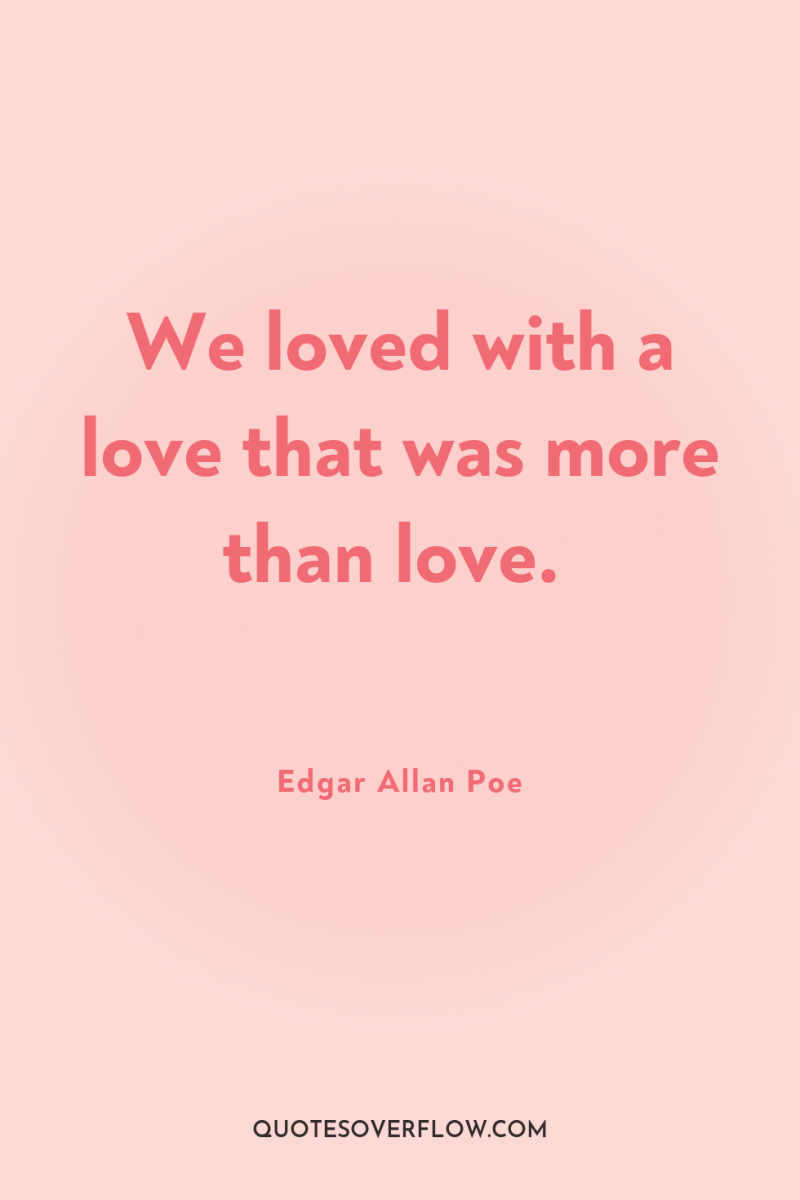
1
We loved with a love that was more than love.Edgar Allan Poe
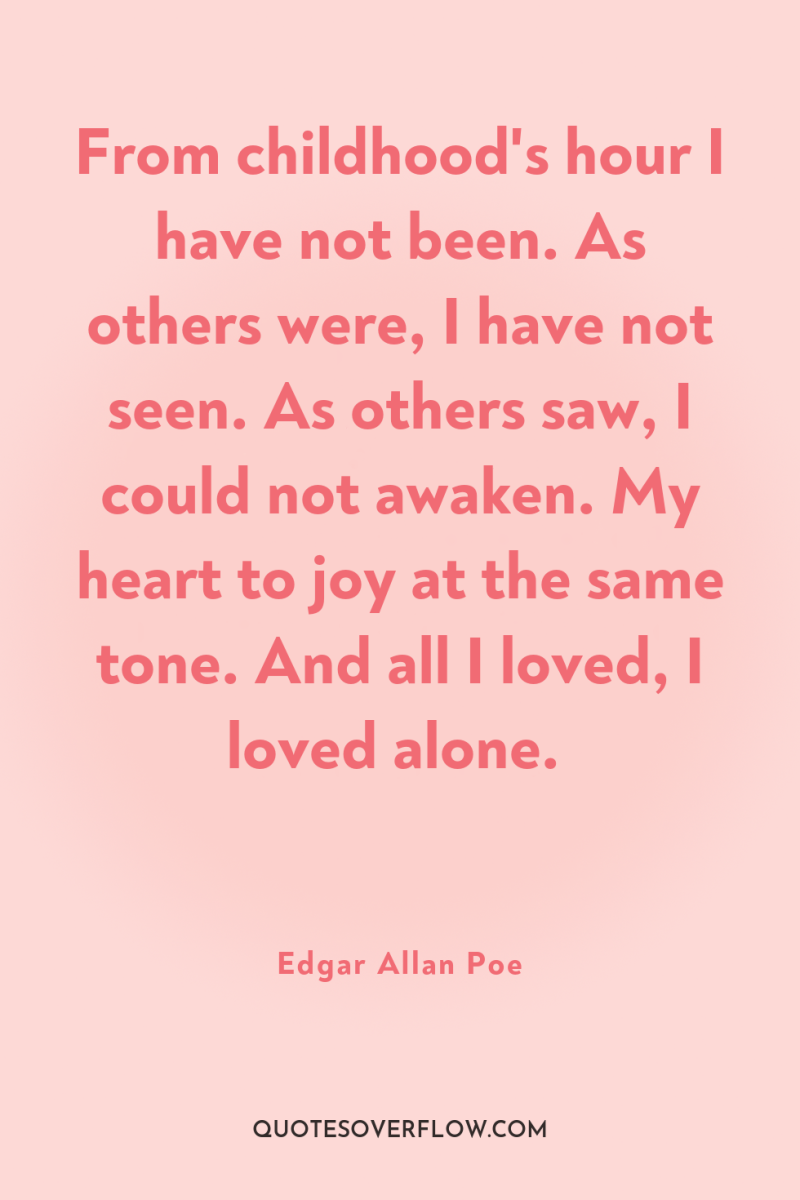
2
From childhood's hour I have not been. As others were, I have not seen. As others saw, I could not awaken. My heart to joy at the same tone. And all I loved, I loved alone.Edgar Allan Poe
3
It was many and many a year ago, In a kingdom by the sea, That a maiden there lived whom you may know By the name of ANNABEL LEE;And this maiden she lived with no other thought Than to love and be loved by me. I was a child and she was a child, In this kingdom by the sea; But we loved with a love that was more than love- I and my Annabel Lee;With a love that the winged seraphs of heaven Coveted her and me. And this was the reason that, long ago, In this kingdom by the sea, A wind blew out of a cloud, chilling My beautiful Annabel Lee;So that her highborn kinsman came And bore her away from me, To shut her up in a sepulchre In this kingdom by the sea. The angels, not half so happy in heaven, Went envying her and me- Yes! - that was the reason (as all men know, In this kingdom by the sea) That the wind came out of the cloud by night, Chilling and killing my Annabel Lee.But our love it was stronger by far than the love Of those who were older than we- Of many far wiser than we- And neither the angels in heaven above, Nor the demons down under the sea, Can ever dissever my soul from the soul Of the beautiful Annabel Lee.For the moon never beams without bringing me dreams Of the beautiful Annabel Lee;And the stars never rise but I feel the bright eyes Of the beautiful Annabel Lee;And so, all the night-tide, I lie down by the side Of my darling- my darling- my life and my bride, In the sepulchre there by the sea, In her tomb by the sounding sea. .Edgar Allan Poe
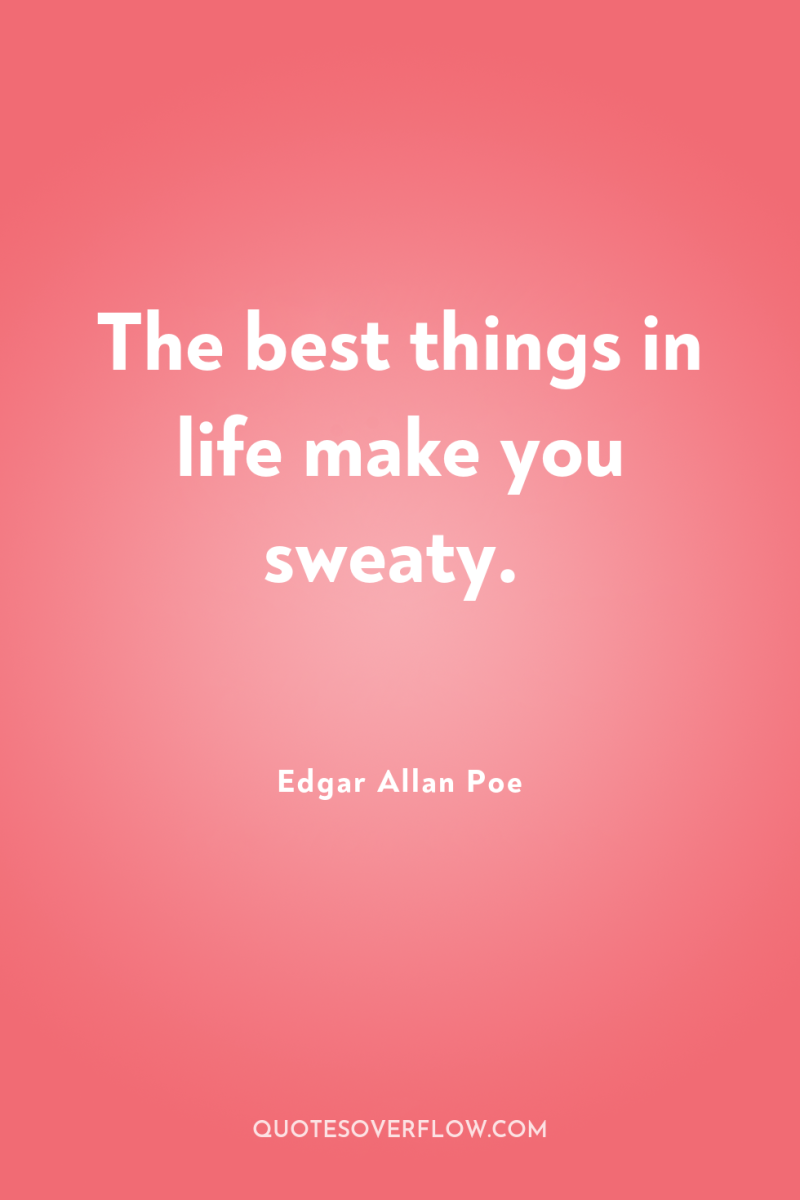
4
The best things in life make you sweaty.Edgar Allan Poe
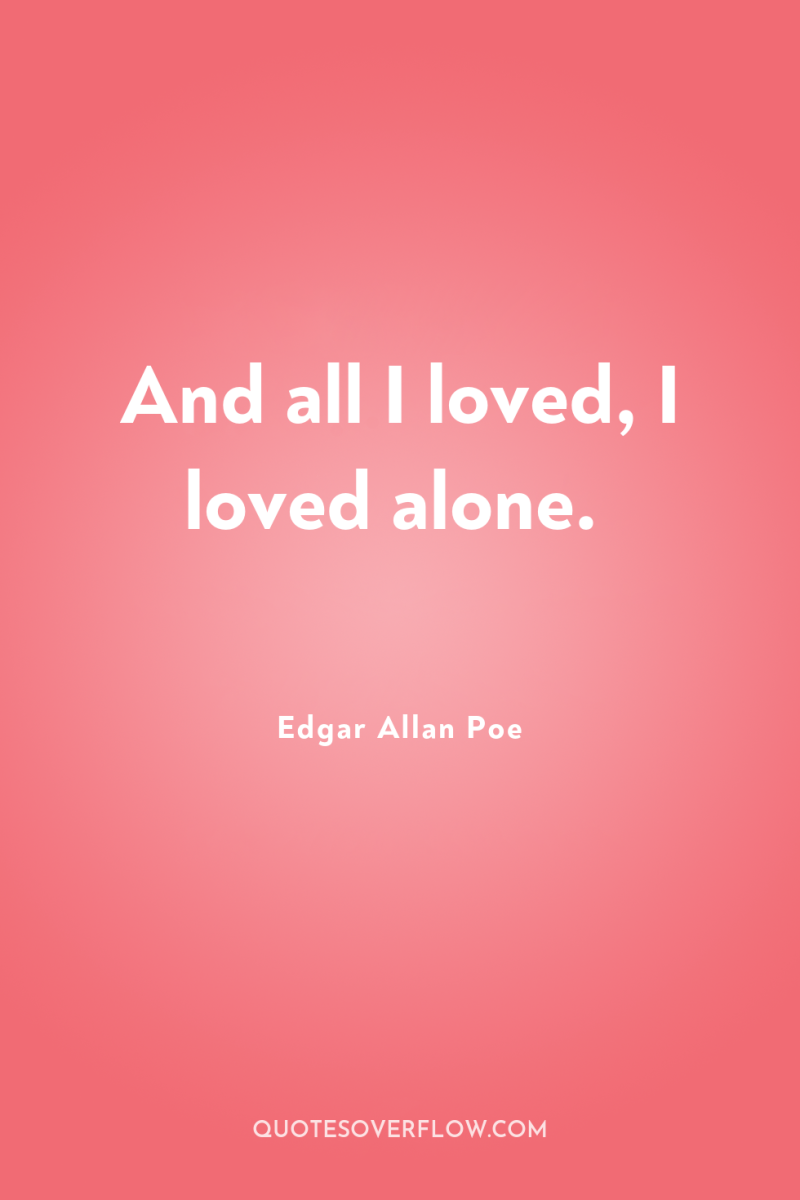
5
And all I loved, I loved alone.Edgar Allan Poe
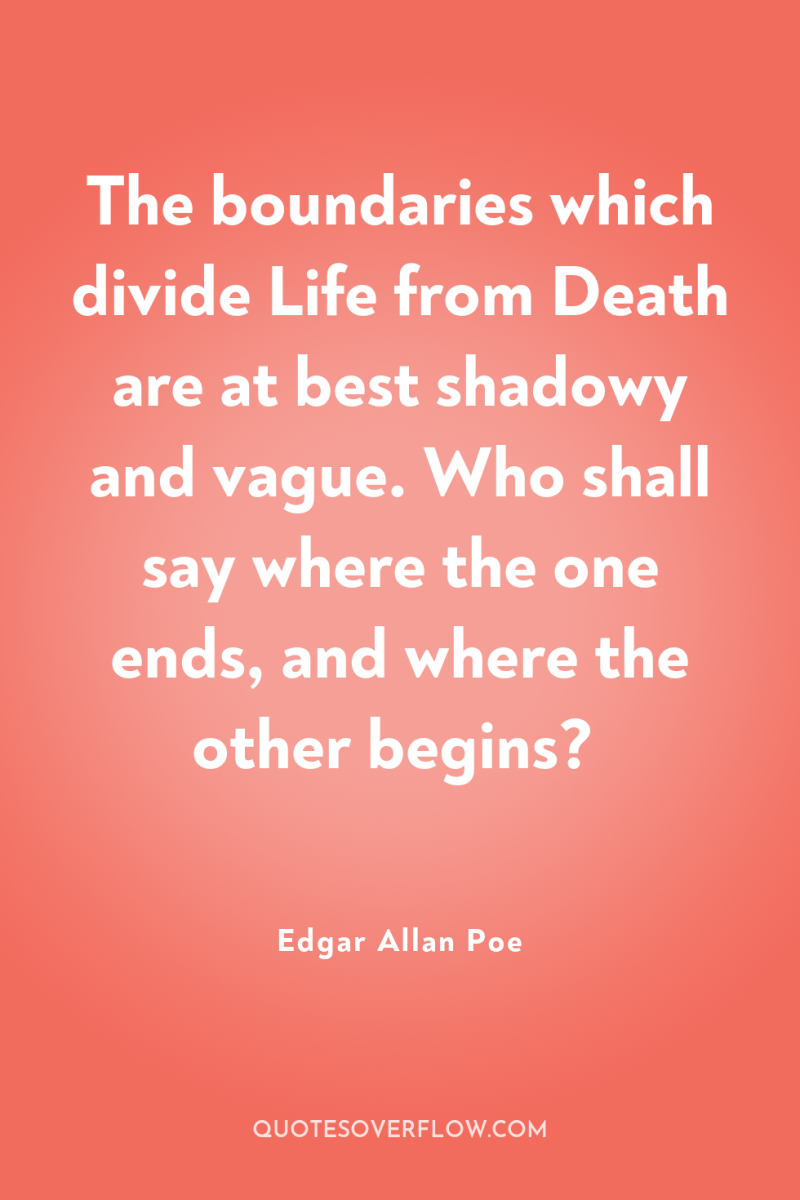
6
The boundaries which divide Life from Death are at best shadowy and vague. Who shall say where the one ends, and where the other begins?Edgar Allan Poe
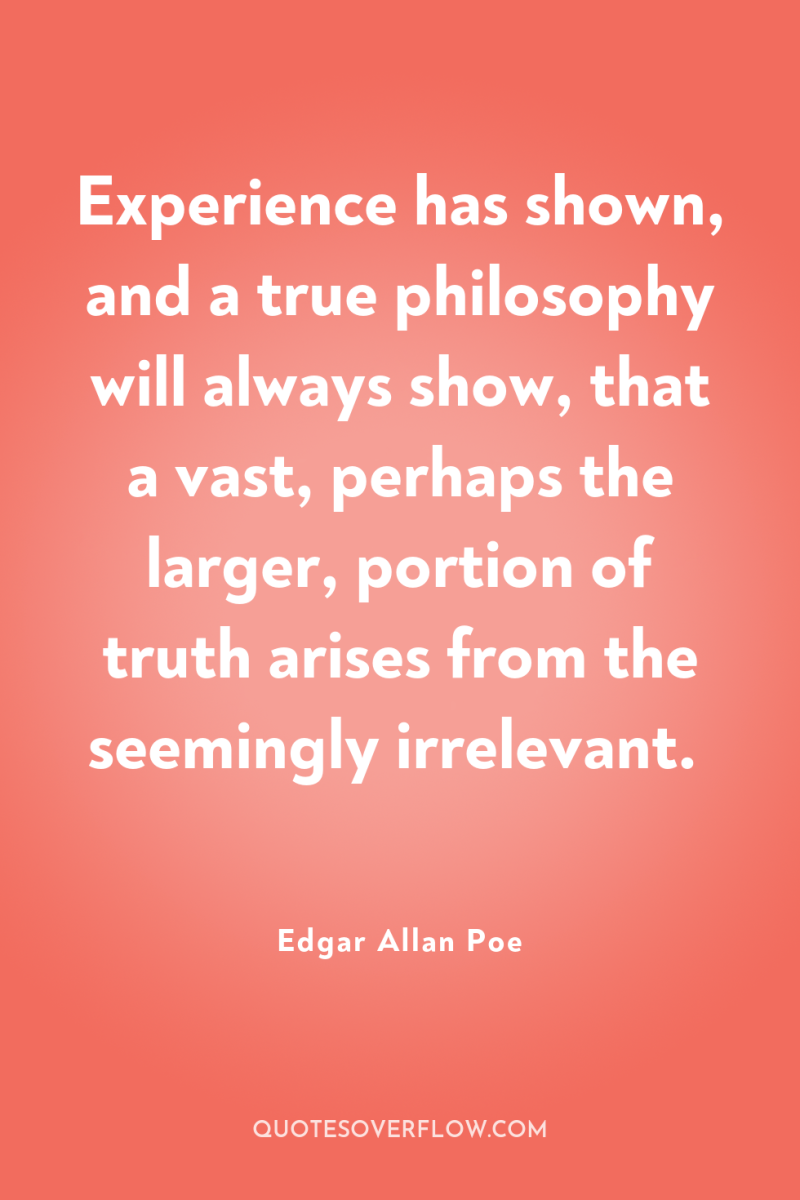
7
Experience has shown, and a true philosophy will always show, that a vast, perhaps the larger, portion of truth arises from the seemingly irrelevant.Edgar Allan Poe
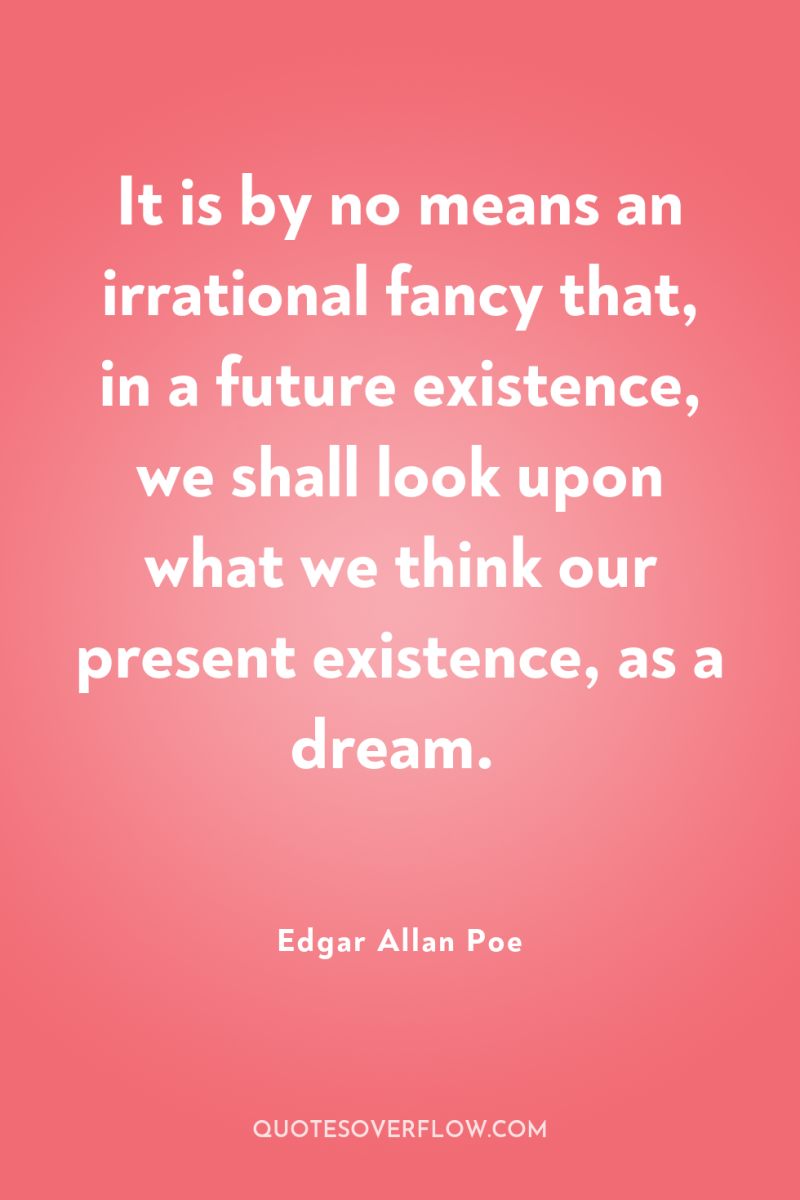
8
It is by no means an irrational fancy that, in a future existence, we shall look upon what we think our present existence, as a dream.Edgar Allan Poe
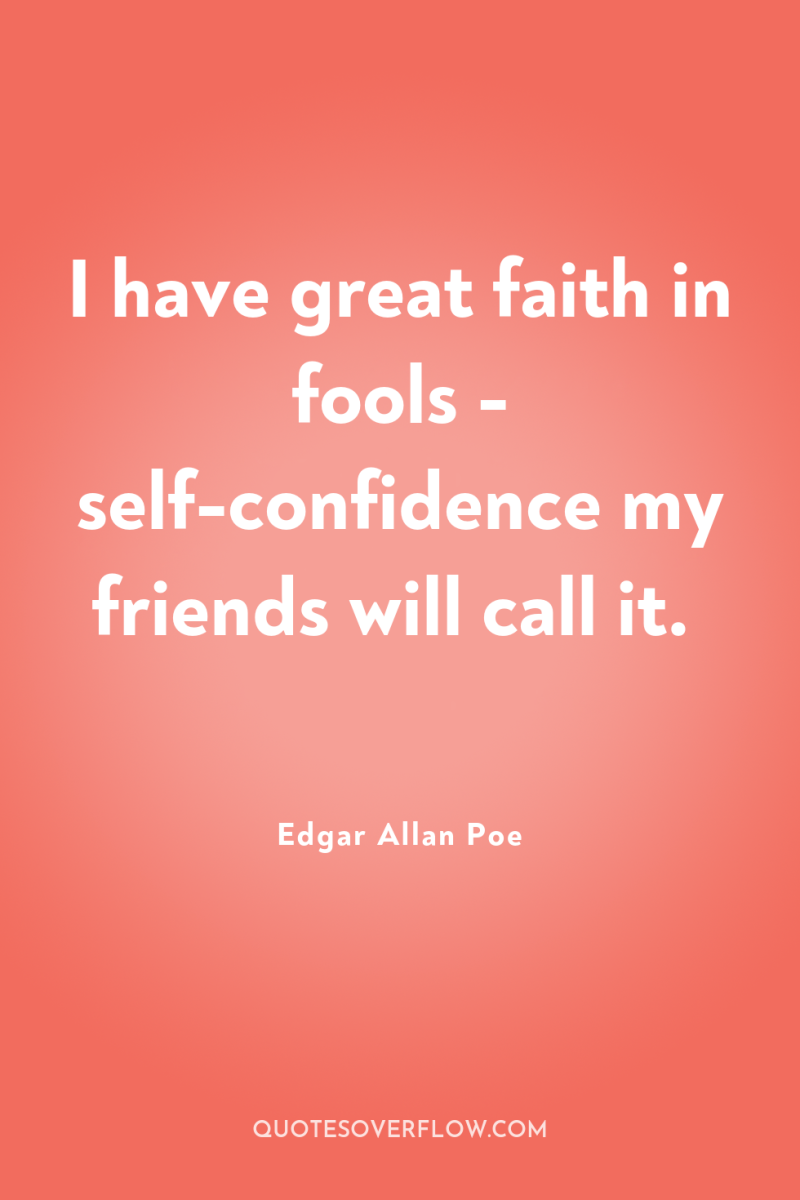
9
I have great faith in fools - self-confidence my friends will call it.Edgar Allan Poe
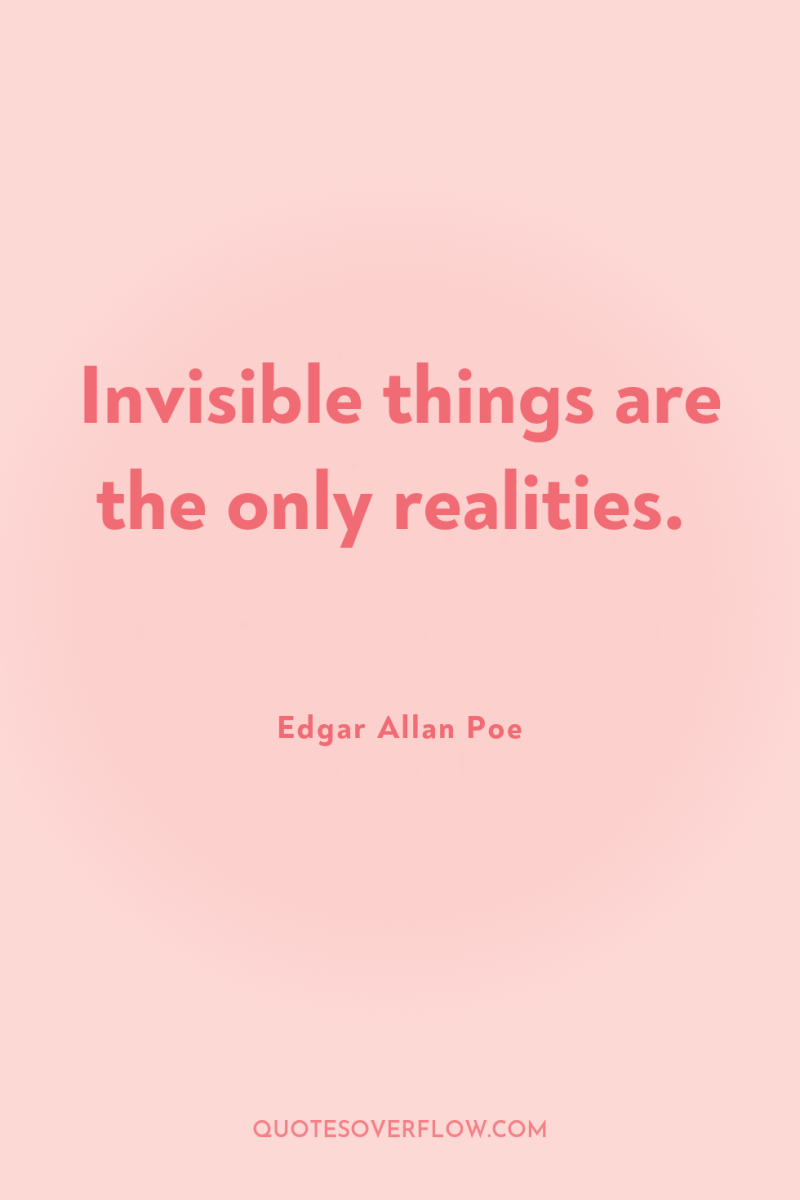
10
Invisible things are the only realities.Edgar Allan Poe
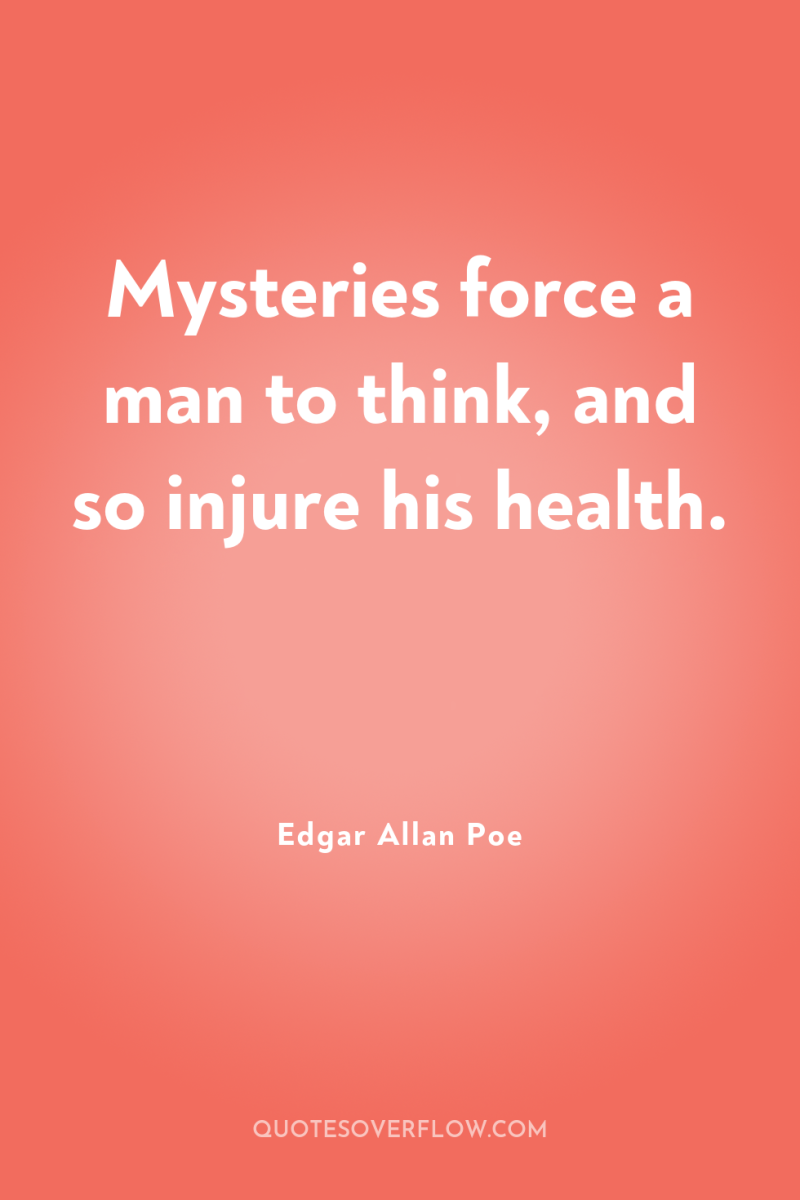
11
Mysteries force a man to think, and so injure his health.Edgar Allan Poe
12
Philosophers have often held dispute As to the seat of thought in man and brute For that the power of thought attends the latter My friend, thy beau, hath made a settled matter, And spite of dogmas current in all ages, One settled fact is better than ten sages. (O, Tempora! O, Mores! )Edgar Allan Poe
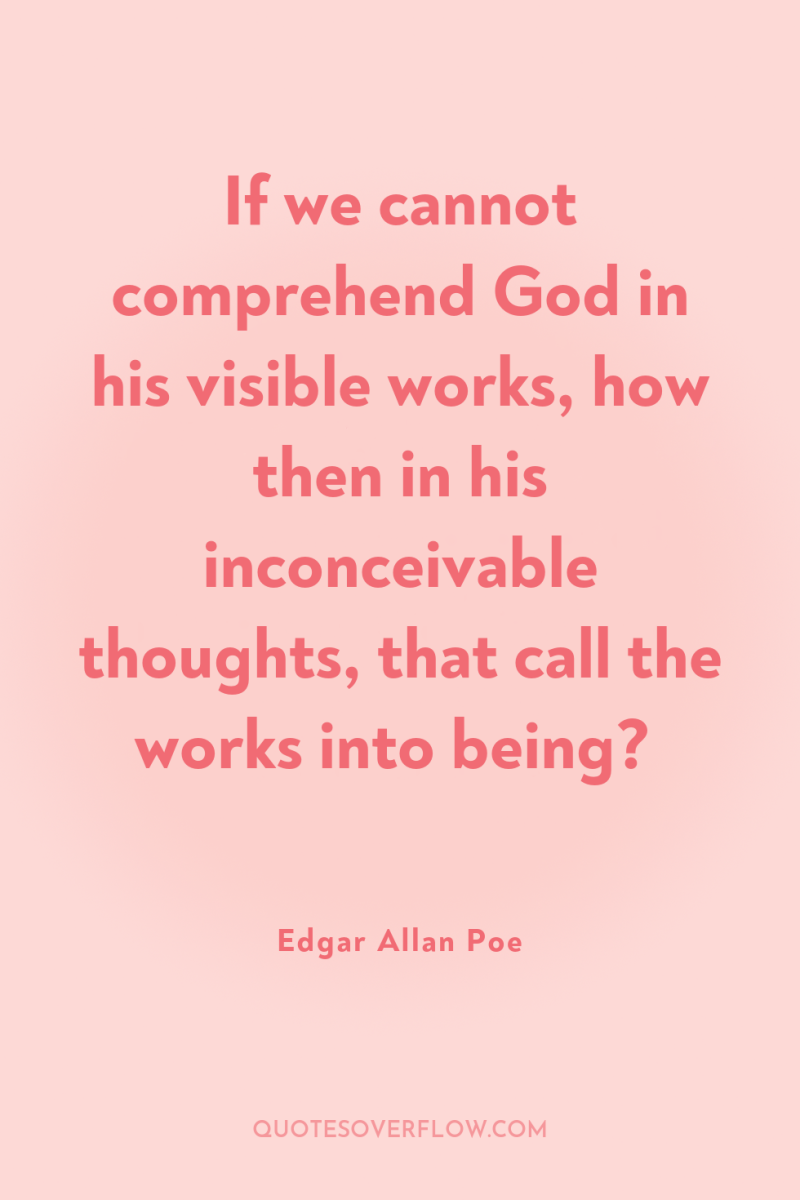
13
If we cannot comprehend God in his visible works, how then in his inconceivable thoughts, that call the works into being?Edgar Allan Poe
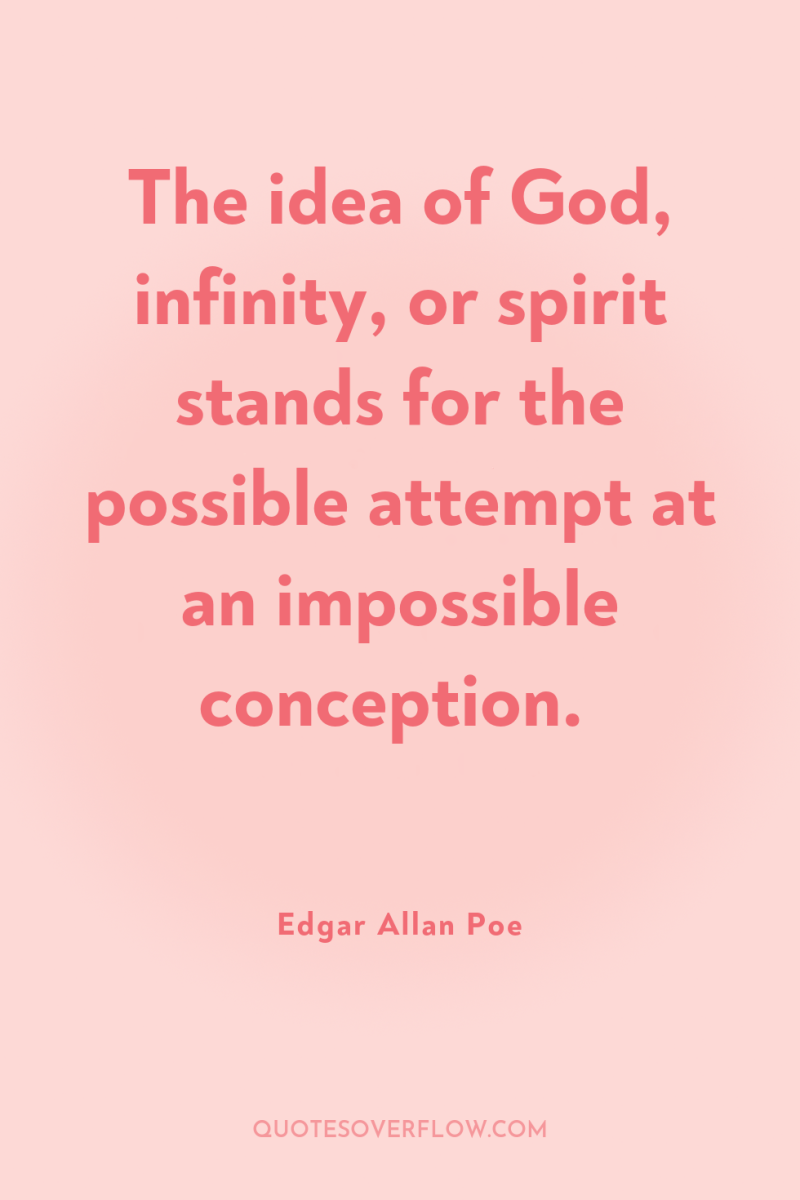
14
The idea of God, infinity, or spirit stands for the possible attempt at an impossible conception.Edgar Allan Poe
15
Those who dream by day are cognizant of many things which escape those who dream only by night. In their gray visions they obtain glimpses of eternity, and thrill, in waking, to find that they have been upon the verge of the great secret. In snatches, they learn something of the wisdom which is of good, and more of the mere knowledge which is of evil.Edgar Allan Poe
16
I have no faith in human perfectibility. I think that human exertion will have no appreciable effect upon humanity. Man is now only more active - not more happy - nor more wise, than he was 6000 years ago.Edgar Allan Poe
17
I Hear the sledges with the bells - Silver bells! What a world of merriment their melody foretells! How they tinkle, tinkle, tinkle, In the icy air of night! While the stars that oversprinkle All the heavens, seem to twinkle With a crystalline delight; Keeping time, time, time, In a sort of Runic rhyme, To the tintinnabulation that so musically wells From the bells, bells, bells, bells, Bells, bells, bells - From the jingling and the tinkling of the bells. II Hear the mellow wedding bells - Golden bells! What a world of happiness their harmony foretells! Through the balmy air of night How they ring out their delight! - From the molten - golden notes, And all in tune, What a liquid ditty floats To the turtle - dove that listens, while she gloats On the moon! Oh, from out the sounding cells, What a gush of euphony voluminously wells! How it swells! How it dwells On the Future! - how it tells Of the rapture that impels To the swinging and the ringing Of the bells, bells, bells - Of the bells, bells, bells, bells, Bells, bells, bells - To the rhyming and the chiming of the bells! III Hear the loud alarum bells - Brazen bells! What a tale of terror, now, their turbulency tells! In the startled ear of night How they scream out their affright! Too much horrified to speak, They can only shriek, shriek, Out of tune, In a clamorous appealing to the mercy of the fire, In a mad expostulation with the deaf and frantic fire, Leaping higher, higher, higher, With a desperate desire, And a resolute endeavor Now - now to sit, or never, By the side of the pale - faced moon. Oh, the bells, bells, bells! What a tale their terror tells Of Despair! How they clang, and clash and roar! What a horror they outpour On the bosom of the palpitating air! Yet the ear, it fully knows, By the twanging, And the clanging, How the danger ebbs and flows; Yet the ear distinctly tells, In the jangling, And the wrangling, How the danger sinks and swells, By the sinking or the swelling in the anger of the bells - Of the bells - Of the bells, bells, bells, bells, Bells, bells, bells - In the clamor and the clanging of the bells! IV Hear the tolling of the bells - Iron bells! What a world of solemn thought their monody compels! In the silence of the night, How we shiver with affright At the melancholy menace of their tone! For every sound that floats From the rust within their throats Is a groan. And the people - ah, the people - They that dwell up in the steeple, All alone, And who, tolling, tolling, tolling, In that muffled monotone, Feel a glory in so rolling On the human heart a stone - They are neither man nor woman - They are neither brute nor human - They are Ghouls: - And their king it is who tolls: - And he rolls, rolls, rolls, Rolls A paean from the bells! And his merry bosom swells With the paean of the bells! And he dances, and he yells; Keeping time, time, time, In a sort of Runic rhyme, To the paean of the bells: - Of the bells: Keeping time, time, time In a sort of Runic rhyme, To the throbbing of the bells - Of the bells, bells, bells: - To the sobbing of the bells: - Keeping time, time, time, As he knells, knells, knells, In a happy Runic rhyme, To the rolling of the bells - Of the bells, bells, bells - To the tolling of the bells - Of the bells, bells, bells, bells, Bells, bells, bells, - To the moaning and the groaning of the bells. .Edgar Allan Poe
18
How is it that from beauty I have derived a type of unloveliness?–from the covenant of peace a simile of sorrow? But as, in ethics, evil is a consequence of good, so, in fact, out of joy is sorrow born.Edgar Allan Poe
19
To HelenI saw thee once-once only-years ago; I must not say how many-but not many. It was a july midnight; and from out A full-orbed moon, that, like thine own soul, soaring, Sought a precipitate pathway up through heaven, There fell a silvery-silken veil of light, With quietude, and sultriness, and slumber Upon the upturn'd faces of a thousand Roses that grew in an enchanted garden, Where no wind dared to stir, unless on tiptoe- Fell on the upturn'd faces of these roses That gave out, in return for the love-light Thier odorous souls in an ecstatic death- Fell on the upturn'd faces of these roses That smiled and died in this parterre, enchanted by thee, by the poetry of thy prescence. Clad all in white, upon a violet bank I saw thee half reclining; while the moon Fell on the upturn'd faces of the roses And on thine own, upturn'd-alas, in sorrow! Was it not Fate that, on this july midnight- Was it not Fate (whose name is also sorrow) That bade me pause before that garden-gate, To breathe the incense of those slumbering roses? No footstep stirred; the hated world all slept, Save only thee and me. (Oh Heaven- oh, God! How my heart beats in coupling those two worlds! ) Save only thee and me. I paused- I looked- And in an instant all things disappeared.( Ah, bear in mind this garden was enchanted! ) The pearly lustre of the moon went out; The mossy banks and the meandering paths, The happy flowers and the repining trees, Were seen no more: the very roses' odors Died in the arms of the adoring airs. All- all expired save thee- save less than thou: Save only the divine light in thine eyes- Save but the soul in thine uplifted eyes. I saw but them- they were the world to me. I saw but them- saw only them for hours- Saw only them until the moon went down. What wild heart-histories seemed to lie enwritten Upon those crystalline, celestial spheres! How dark a woe! yet how sublime a hope! How silently serene a sea of pride! How daring an ambition! yet how deep- How fathomless a capacity for love! But now, at length, dear Dian sank from sight, Into western couch of thunder-cloud; And thou, a ghost, amid the entombing trees Didst glide away. Only thine eyes remained. They would not go- they never yet have gone. Lighting my lonely pathway home that night, They have not left me (as my hopes have) since. They follow me- they lead me through the years. They are my ministers- yet I thier slave Thier office is to illumine and enkindle- My duty, to be saved by thier bright light, And purified in thier electric fire, And sanctified in thier Elysian fire. They fill my soul with Beauty (which is Hope), And are far up in heaven- the stars I kneel to In the sad, silent watches of my night; While even in the meridian glare of day I see them still- two sweetly scintillant Venuses, unextinguished by the sun! .Edgar Allan Poe
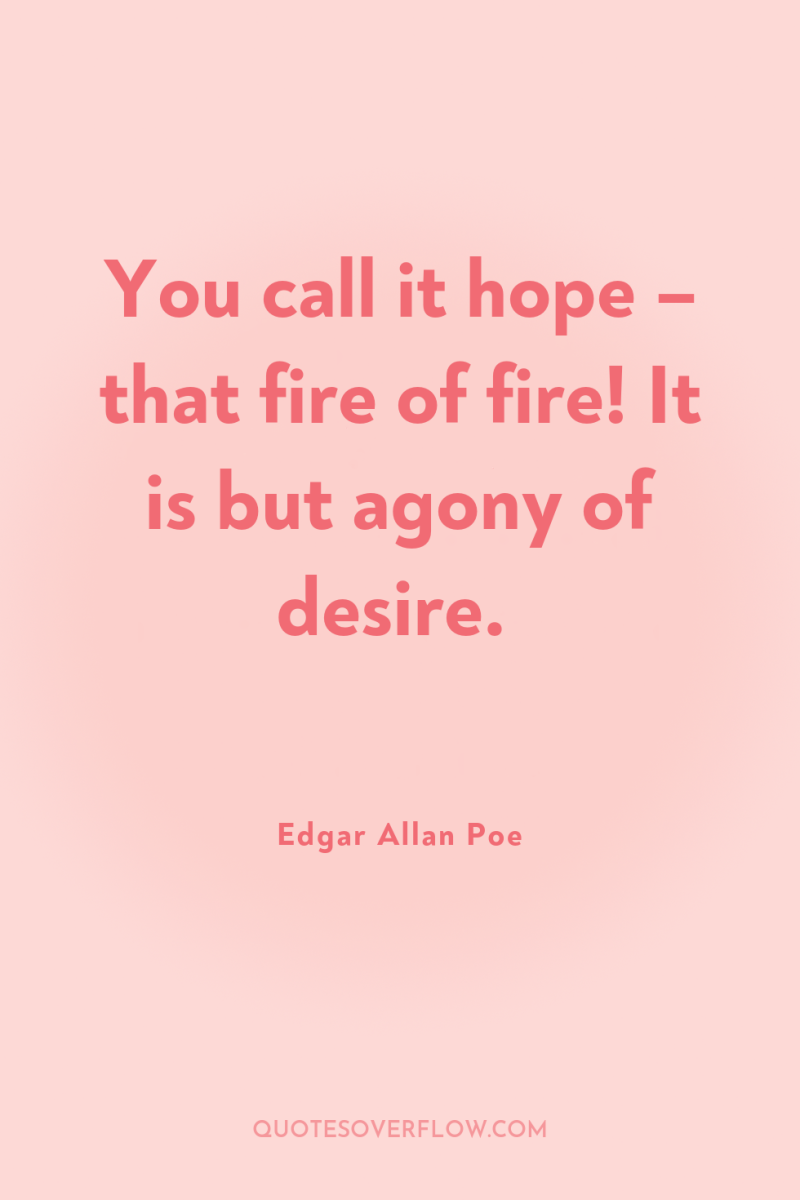
20
You call it hope – that fire of fire! It is but agony of desire.Edgar Allan Poe
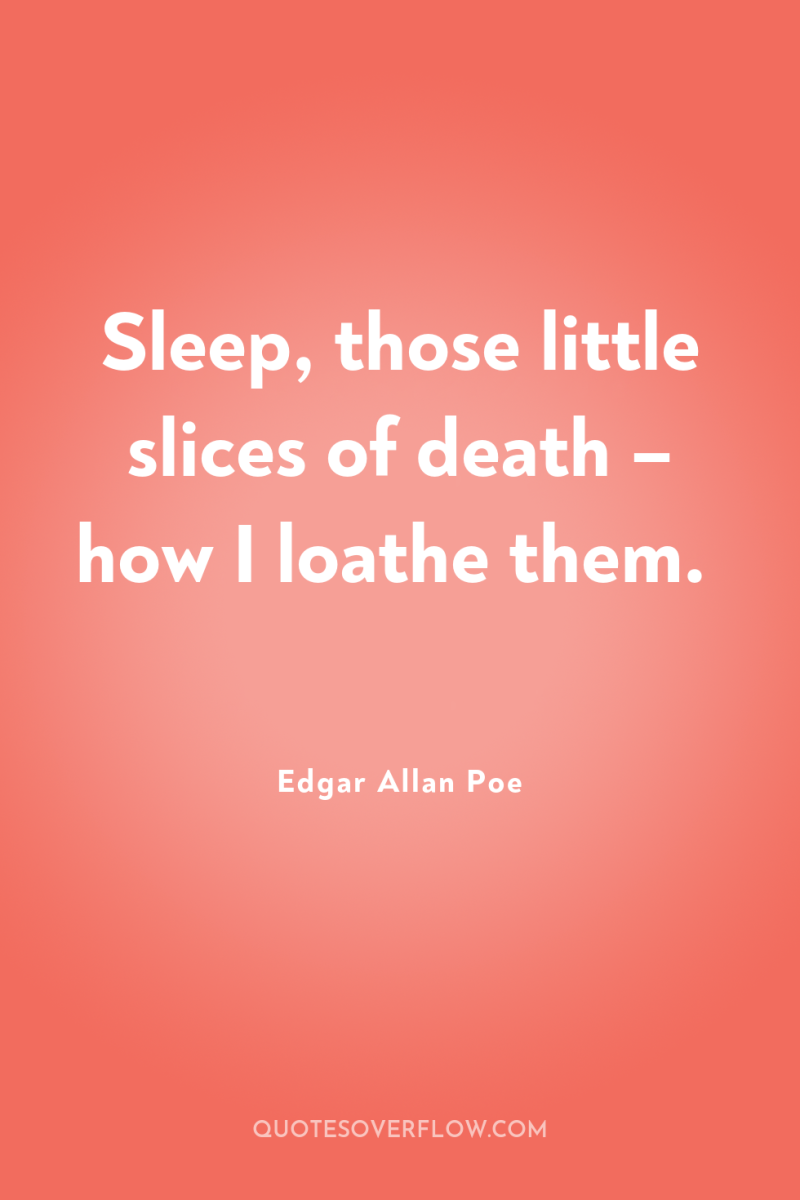
21
Sleep, those little slices of death – how I loathe them.Edgar Allan Poe
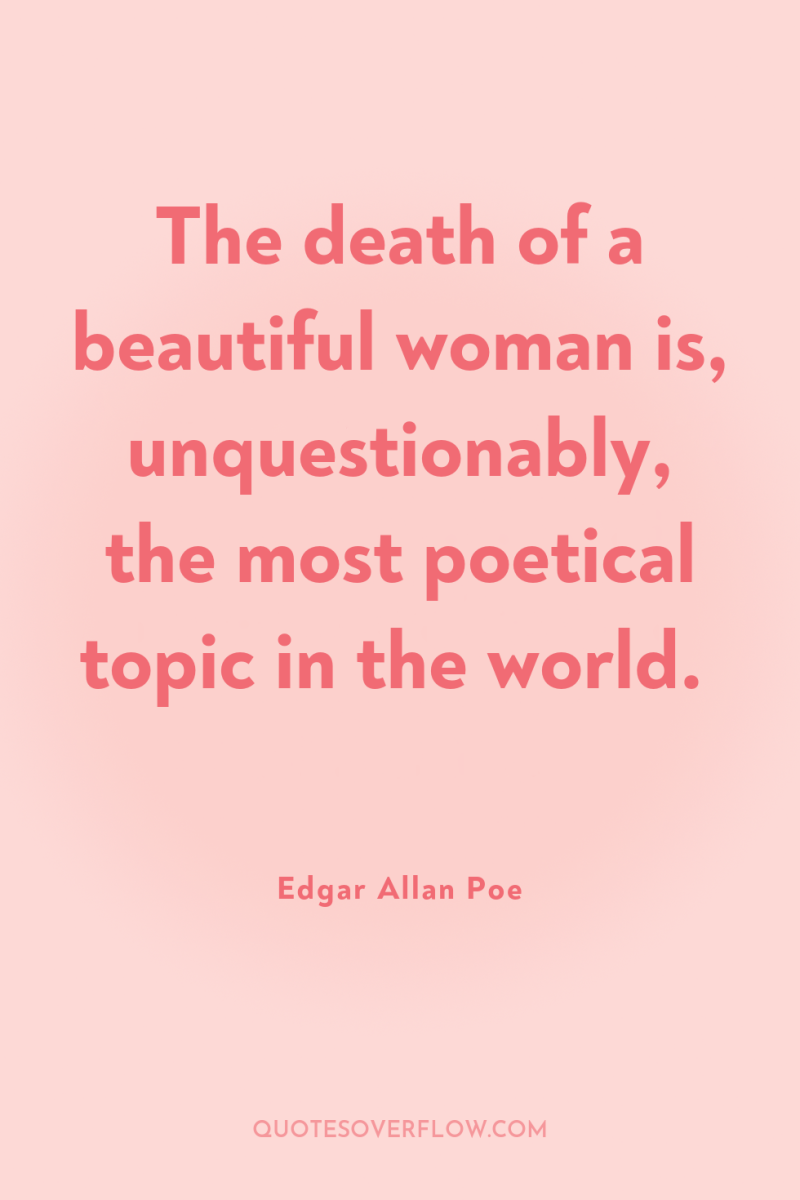
22
The death of a beautiful woman is, unquestionably, the most poetical topic in the world.Edgar Allan Poe
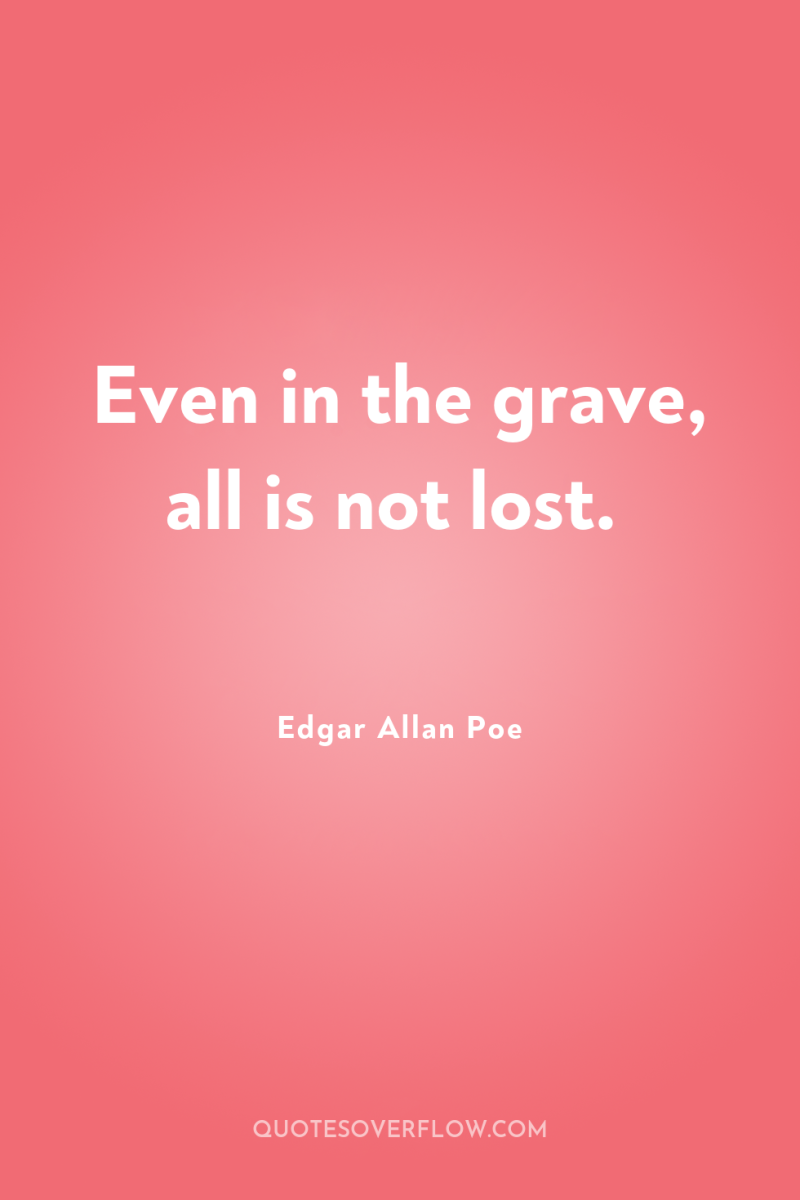
23
Even in the grave, all is not lost.Edgar Allan Poe
24
True, nervous, very, very dreadfully nervous I had been and am, but why will say that I am mad?! The disease had sharpened my senses, not destroyed, not dulled them. Above all was the sense of hearing acute.Edgar Allan Poe
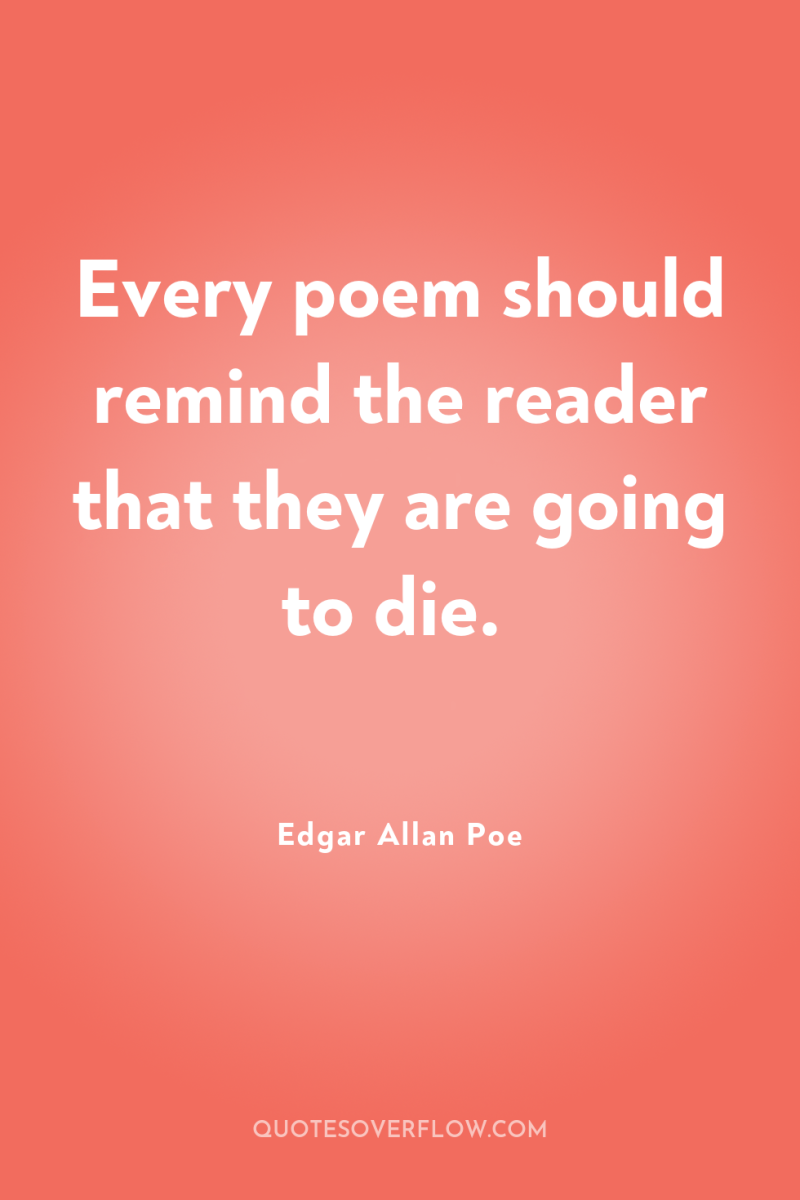
25
Every poem should remind the reader that they are going to die.Edgar Allan Poe
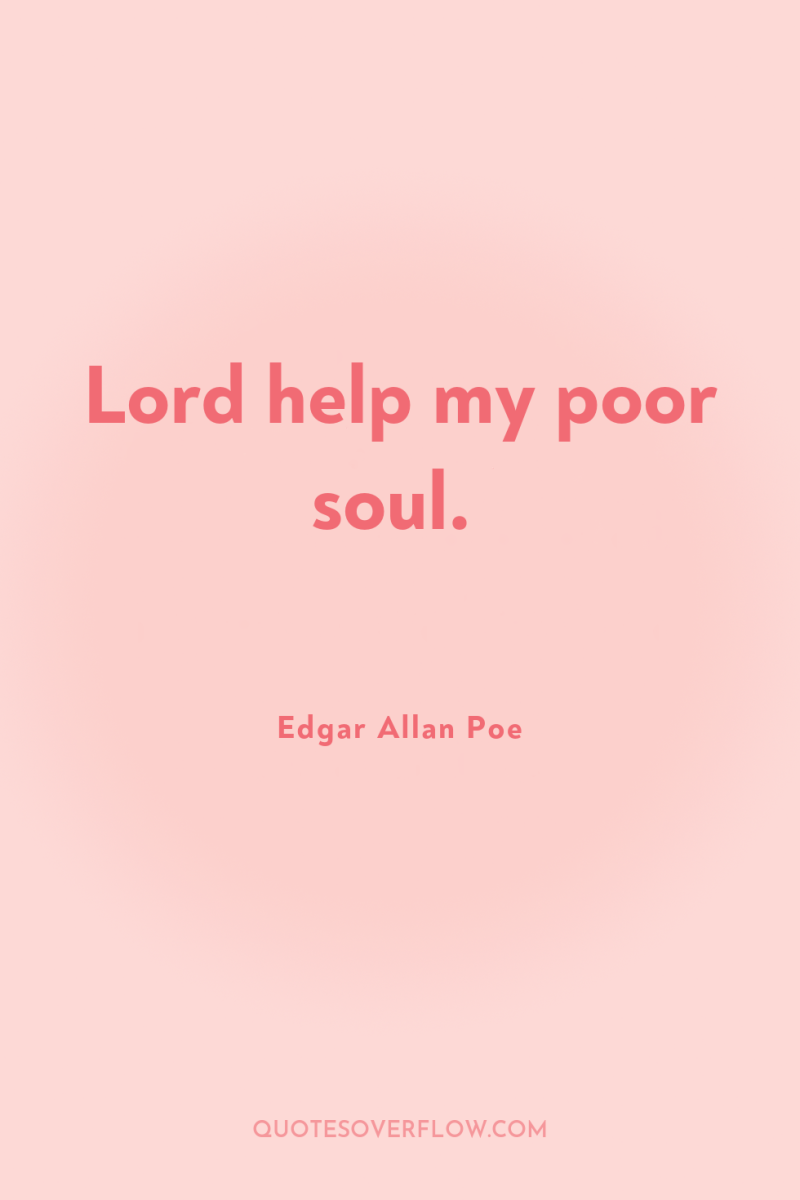
26
Lord help my poor soul.Edgar Allan Poe
27
For the moon never beams without bringing me dreams Of the beautiful Annabel Lee; And the stars never rise but I feel the bright eyes Of the beautiful Annabel Lee; And so, all the night-tide, I lie down by the side Of my darling- my darling- my life and my bride, In the sepulchre there by the sea, In her tomb by the sounding sea.Edgar Allan Poe
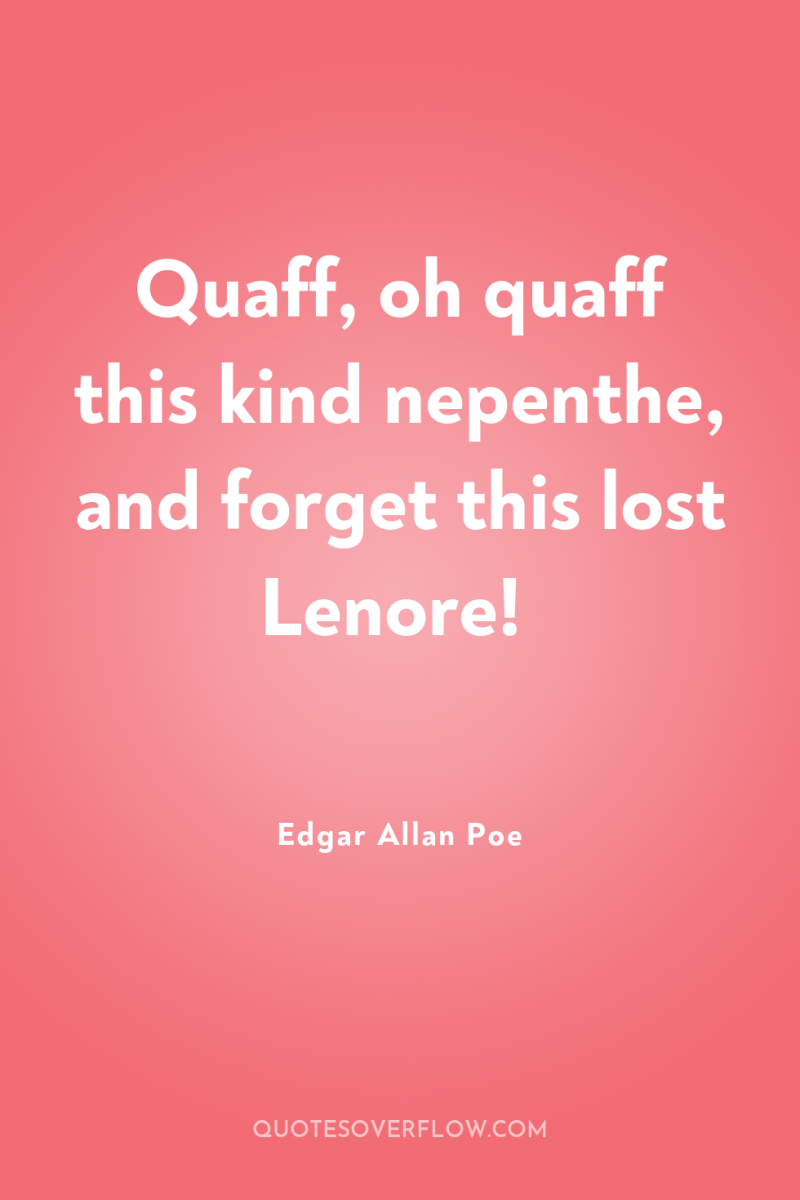
28
Quaff, oh quaff this kind nepenthe, and forget this lost Lenore!Edgar Allan Poe
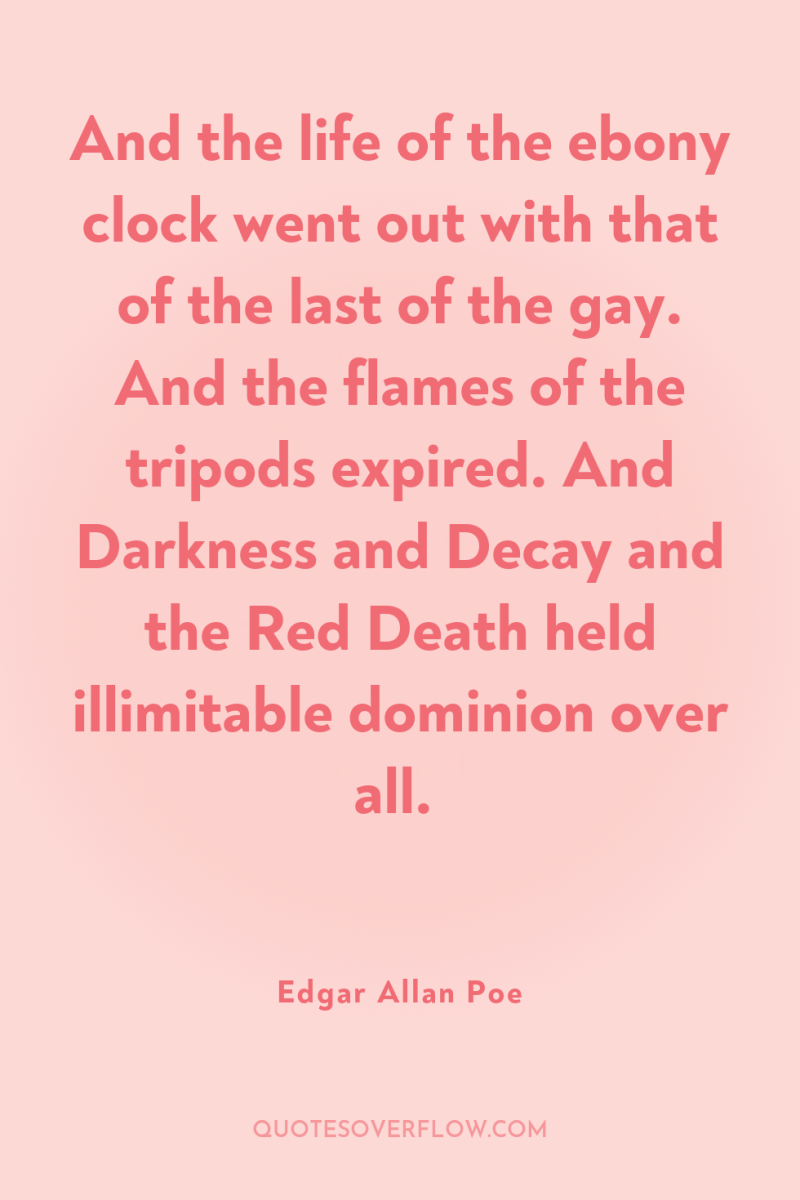
29
And the life of the ebony clock went out with that of the last of the gay. And the flames of the tripods expired. And Darkness and Decay and the Red Death held illimitable dominion over all.Edgar Allan Poe
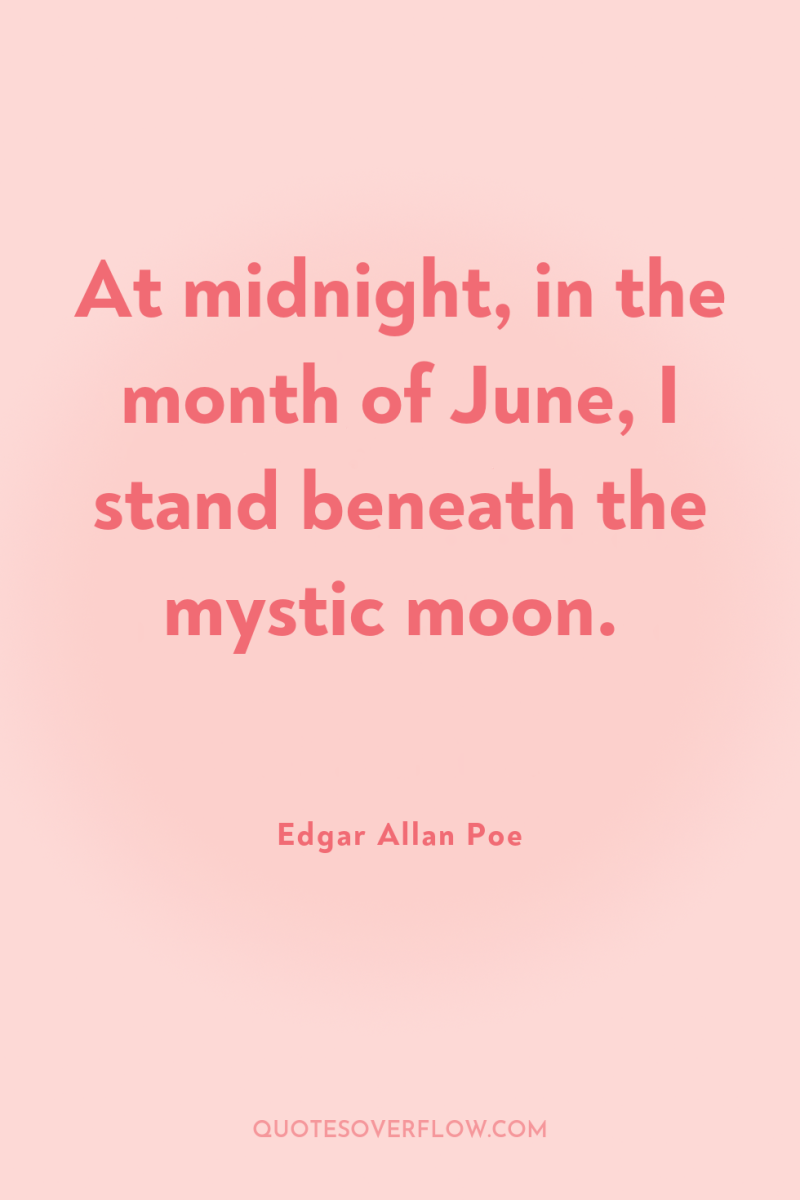
30
At midnight, in the month of June, I stand beneath the mystic moon.Edgar Allan Poe
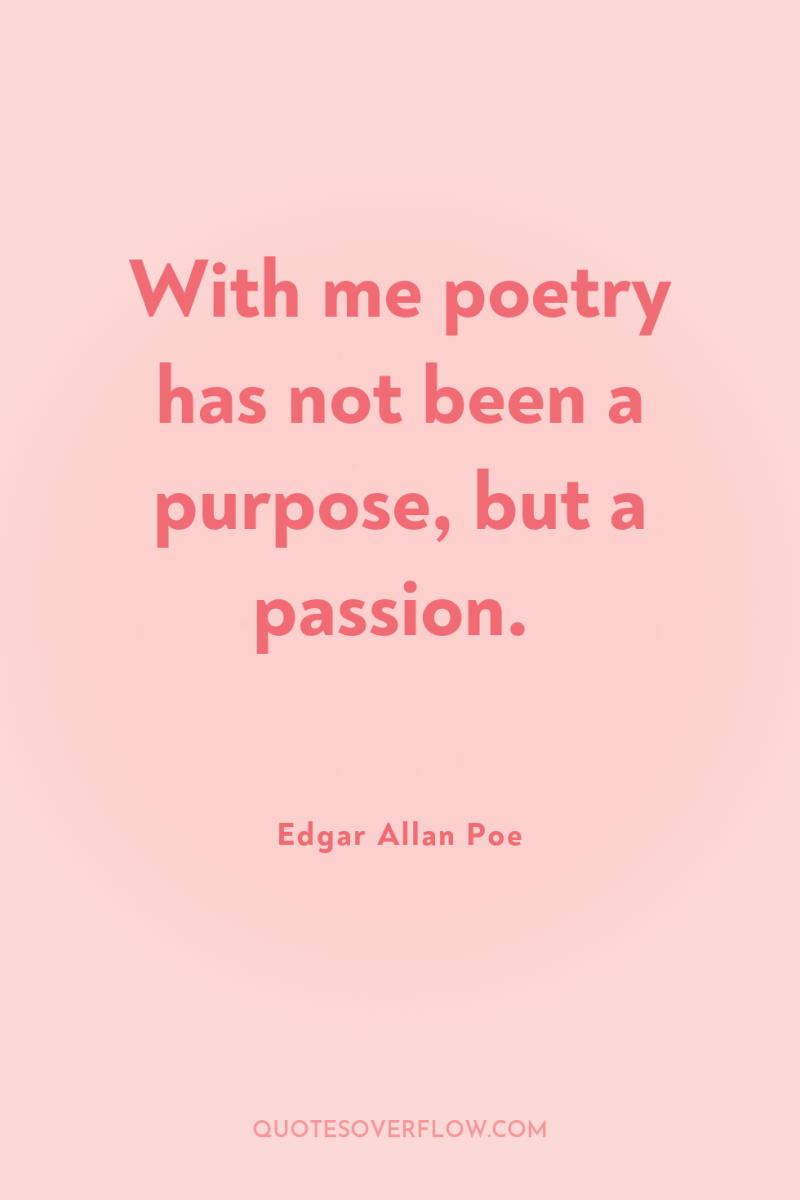
31
With me poetry has not been a purpose, but a passion.Edgar Allan Poe
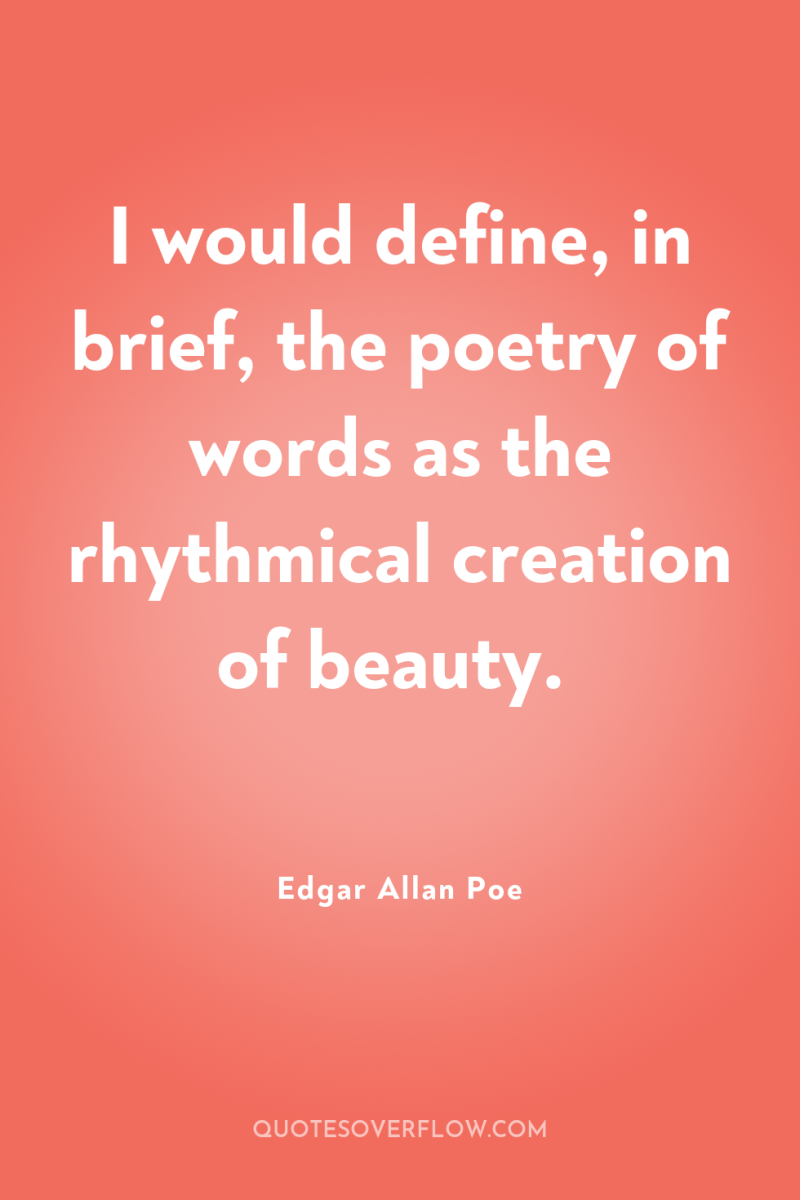
32
I would define, in brief, the poetry of words as the rhythmical creation of beauty.Edgar Allan Poe
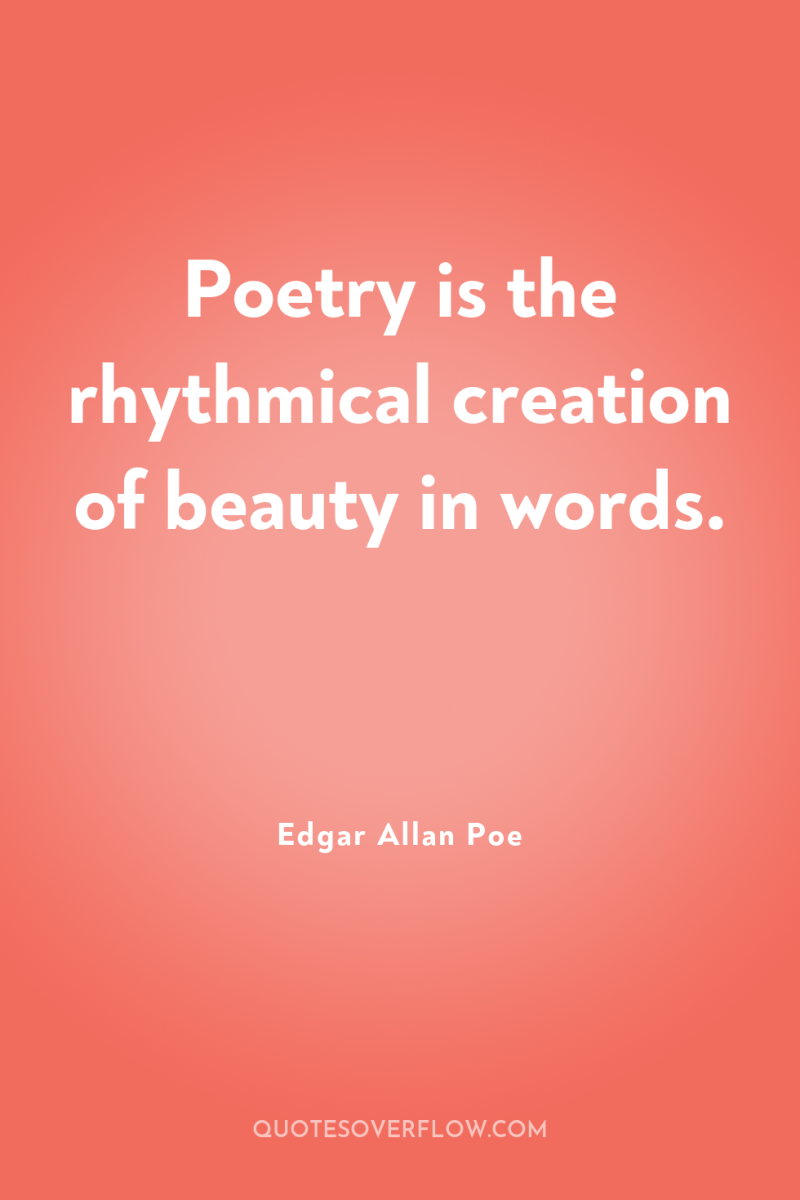
33
Poetry is the rhythmical creation of beauty in words.Edgar Allan Poe
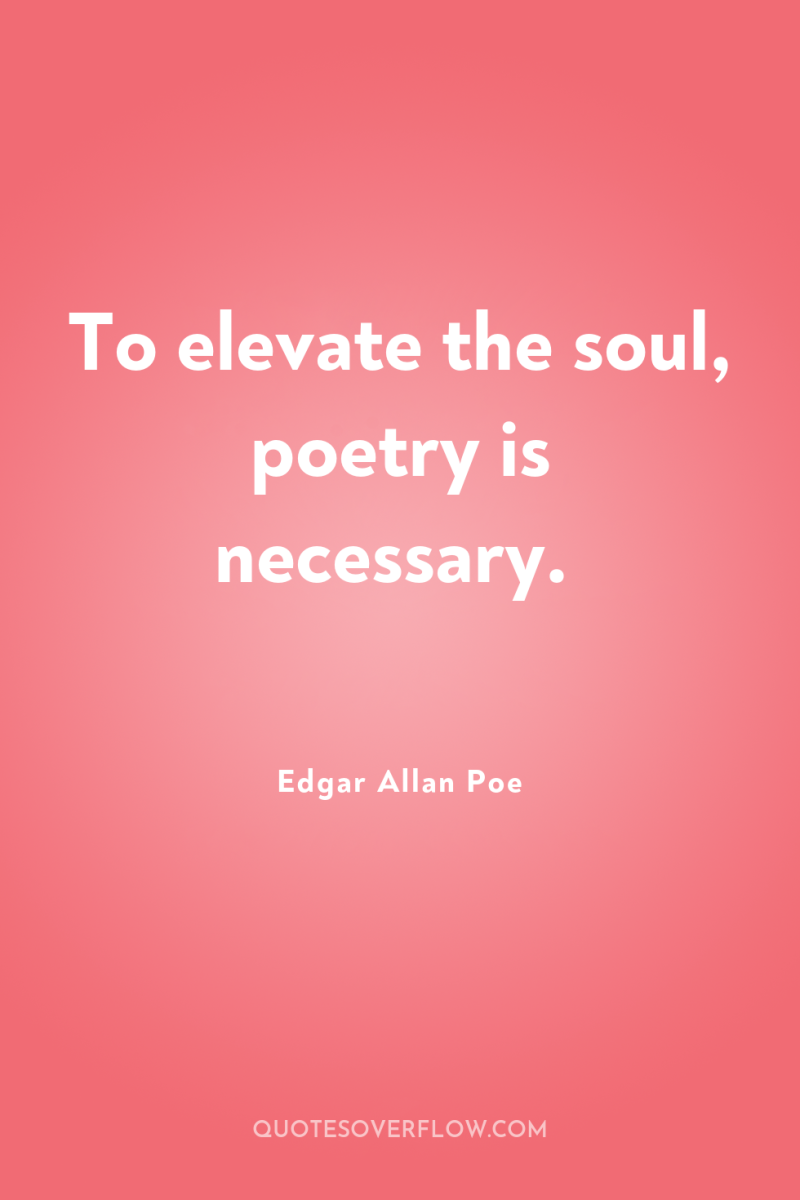
34
To elevate the soul, poetry is necessary.Edgar Allan Poe
35
From childhood's hour I have not been As others were; I have not seen As others saw; I could not bring My passions from a common spring. From the same source I have not taken My sorrow; I could not awaken My heart to joy at the same tone; And all I loved, I loved alone. Then- in my childhood, in the dawn Of a most stormy life- was drawn From every depth of good and ill The mystery which binds me still: From the torrent, or the fountain, From the red cliff of the mountain, From the sun that round me rolled In its autumn tint of gold, From the lightning in the sky As it passed me flying by, From the thunder and the storm, And the cloud that took the form( When the rest of Heaven was blue) Of a demon in my view.Edgar Allan Poe
36
Once upon a midnight dreary, while I pondered, weak and weary, Over many a quaint and curious volume of forgotten lore – While I nodded, nearly napping, suddenly there came a tapping, As of some one gently rapping, rapping at my chamber door.Edgar Allan Poe
37
Take this kiss upon the brow! And, in parting from you now, Thus much let me avow- You are not wrong, who deem That my days have been a dream; Yet if hope has flown away In a night, or in a day, In a vision, or in none, ? that we see or seem Is but a dream within a dream.Edgar Allan Poe
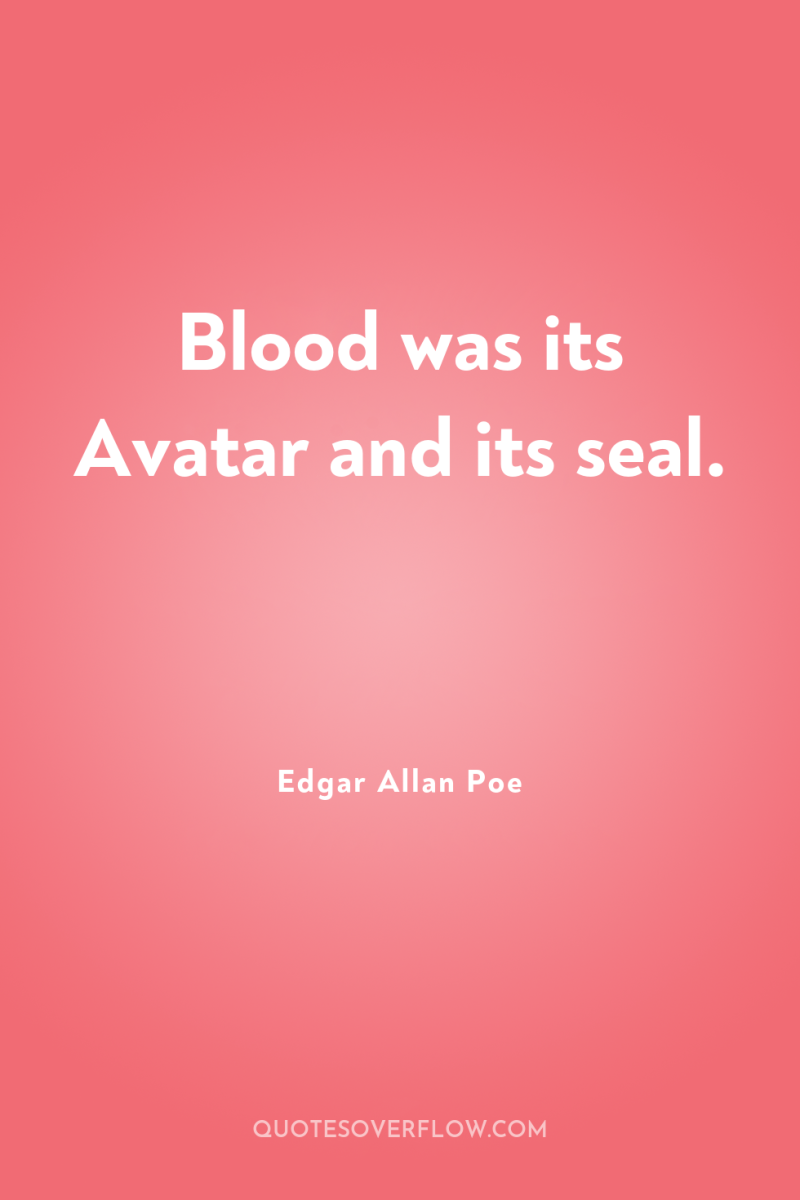
38
Blood was its Avatar and its seal.Edgar Allan Poe
39
And the Raven, never flitting, still is sitting, still is sitting On the pallid bust of Pallas just above my chamber door; And his eyes have all the seeming of a demon's that is dreaming, And the lamp-light o'er him streaming throws his shadow on the floor: And my soul from out that shadow that lies floating on the floor Shall be lifted – nevermore!Edgar Allan Poe
40
By a route obscure and lonely Haunted by ill angels only, Where an eidolon, named NIGHT, On a black throne reigns upright, I have reached these lands but newly From an ultimate dim Thule --From a wild, weird clime that lieth, sublime, Out of SPACE, out of TIME.Edgar Allan Poe
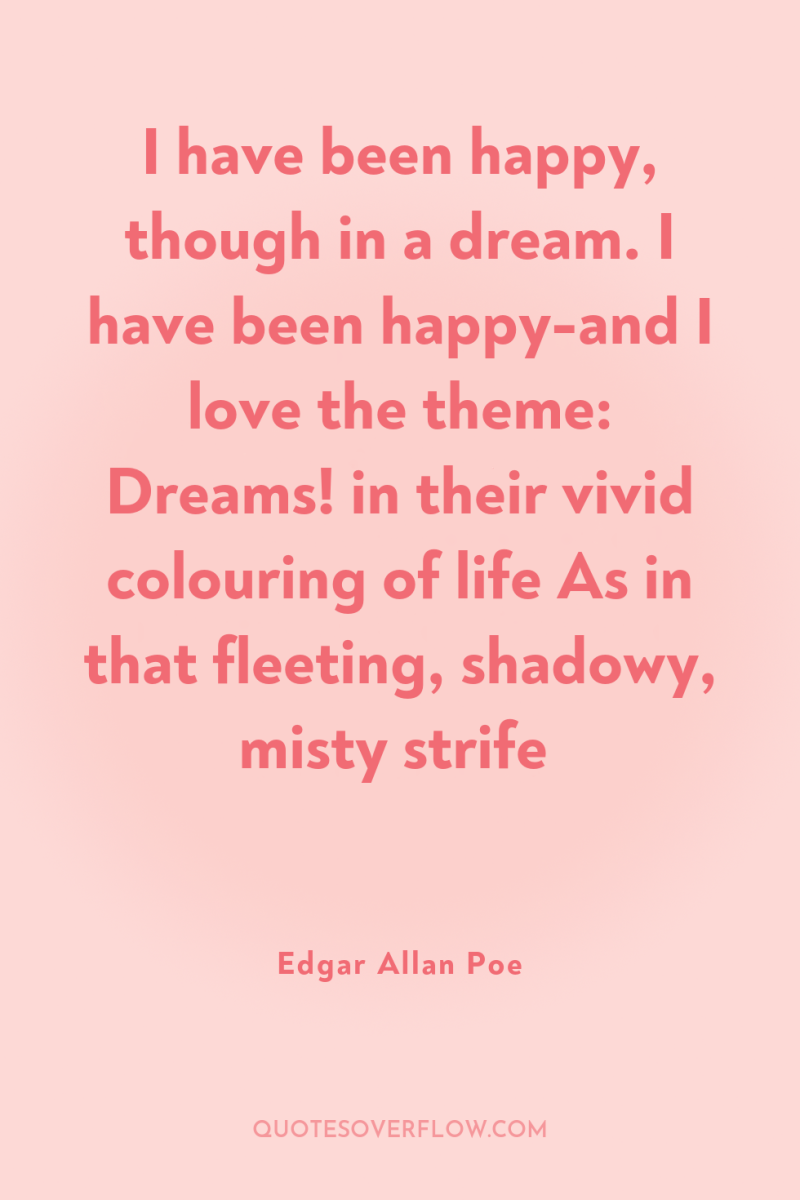
41
I have been happy, though in a dream. I have been happy-and I love the theme: Dreams! in their vivid colouring of life As in that fleeting, shadowy, misty strifeEdgar Allan Poe
42
It was many and many a year ago, In a kingdom by the sea, That a maiden there lived whom you may know By the name of ANNABEL LEE;And this maiden she lived with no other thought Than to love and be loved by me. I was a child and she was a child, In this kingdom by the sea; But we loved with a love that was more than love- I and my Annabel Lee;With a love that the winged seraphs of heaven Coveted her and me. And this was the reason that, long ago, In this kingdom by the sea, A wind blew out of a cloud, chilling My beautiful Annabel Lee;So that her highborn kinsman came And bore her away from me, To shut her up in a sepulchre In this kingdom by the sea. The angels, not half so happy in heaven, Went envying her and me- Yes! - that was the reason (as all men know, In this kingdom by the sea) That the wind came out of the cloud by night, Chilling and killing my Annabel Lee.But our love it was stronger by far than the love Of those who were older than we- Of many far wiser than we- And neither the angels in heaven above, Nor the demons down under the sea, Can ever dissever my soul from the soul Of the beautiful Annabel Lee.For the moon never beams without bringing me dreams Of the beautiful Annabel Lee;And the stars never rise but I feel the bright eyes Of the beautiful Annabel Lee;And so, all the night-tide, I lie down by the side Of my darling- my darling- my life and my bride, In the sepulchre there by the sea, In her tomb by the sounding sea." "It was many and many a year ago, In a kingdom by the sea, That a maiden there lived whom you may know By the name of ANNABEL LEE;And this maiden she lived with no other thought Than to love and be loved by me. I was a child and she was a child, In this kingdom by the sea; But we loved with a love that was more than love- I and my Annabel Lee;With a love that the winged seraphs of heaven Coveted her and me. And this was the reason that, long ago, In this kingdom by the sea, A wind blew out of a cloud, chilling My beautiful Annabel Lee;So that her highborn kinsman came And bore her away from me, To shut her up in a sepulchre In this kingdom by the sea. The angels, not half so happy in heaven, Went envying her and me- Yes! - that was the reason (as all men know, In this kingdom by the sea) That the wind came out of the cloud by night, Chilling and killing my Annabel Lee.But our love it was stronger by far than the love Of those who were older than we- Of many far wiser than we- And neither the angels in heaven above, Nor the demons down under the sea, Can ever dissever my soul from the soul Of the beautiful Annabel Lee.For the moon never beams without bringing me dreams Of the beautiful Annabel Lee;And the stars never rise but I feel the bright eyes Of the beautiful Annabel Lee;And so, all the night-tide, I lie down by the side Of my darling- my darling- my life and my bride, In the sepulchre there by the sea, In her tomb by the sounding sea. .Edgar Allan Poe
43
I saw thee once - only once - years ago: I must not say how many - but not many. It was a July midnight; and from out A full-orbed moon, that, like thine own soul, soaring, Sought a precipitate pathway up through heaven, There fell a silvery-silken veil of light, With quietude, and sultriness, and slumber, Upon the upturn'd faces of a thousand Roses that grew in an enchanted garden, Where no wind dared stir, unless on tiptoe -Fell on the upturn'd faces of these roses That gave out, in return for the love-light, Their odorous souls in an ecstatic death -Fell on the upturn'd faces of these roses That smiled and died in the parterre, enchanted By thee, and by the poetry of thy presence. Clad all in white, upon a violet bank I saw thee half reclining; while the moon Fell upon the upturn'd faces of the roses, And on thine own, upturn'd - alas, in sorrow! Was it not Fate, that, on this July midnight -Was it not Fate, (whose name is also Sorrow, )That bade me pause before that garden-gate, To breathe the incense of those slumbering roses? No footsteps stirred: the hated world all slept, Save only thee and me. (Oh, Heaven! - oh, G**! How my heart beats in coupling those two words! ) Save only thee and me. I paused - I looked -And in an instant all things disappeared.( Ah, bear in mind the garden was enchanted! ) The pearly lustre of the moon went out: The mossy banks and the meandering paths, The happy flowers and the repining trees, Were seen no more: the very roses' odors Died in the arms of the adoring airs. All - all expired save thee - save less than thou: Save only divine light in thine eyes -Save but the soul in thine uplifted eyes. I saw but them - they were the world to me. I saw but them - saw only them for hours -Saw only them until the moon went down. What wild heart-histories seemed to lie enwritten Upon those crystalline, celestial spheres! How dark a wo! yet how sublime a hope! How silently serene a sea of pride! How daring an ambition! yet how deep -How fathomless a capacity for love! But now, at length, dear Dian sank from sight, Into a western couch of thunder-cloud; And thou, a ghost, amid the entombing trees Didst glide away. Only thine eyes remained. They would not go - they never yet have gone. Lighting my lonely pathway home that night, They have not left me (as my hopes have) since. They follow me - they lead me through the years. They are my ministers - yet I their slave. Their office is to illumine and enkindle -My duty, to be saved by their bright fire, And purified in their electric fire, And sanctified in their elysian fire. They fill my soul with Beauty (which is Hope, )And are far up in Heaven - the stars I kneel to In the sad, silent watches of my night; While even in the meridian glare of day I see them still - two sweetly scintillant Venuses, unextinguished by the sun!.Edgar Allan Poe
44
Twas noontide of summer, And mid-time of night; And stars, in their orbits, Shone pale, thro' the light Of the brighter, cold moon, ' Mid planets her slaves, Herself in the Heavens, Her beam on the waves. I gazed awhile On her cold smile; Too cold—too cold for me- There pass'd, as a shroud, A fleecy cloud, And I turned away to thee, Proud Evening Star, In thy glory afar, And dearer thy beam shall be; For joy to my heart Is the proud part Thou bearest in Heaven at night, And more I admire Thy distant fire, Than that colder, lowly light.Edgar Allan Poe
45
I have no words – alas! – to tell The loveliness of loving well!Edgar Allan Poe
46
And here, in thought, to thee- In thought that can alone, Ascend thy empire and so be A partner of thy throne, By winged Fantasy, My embassy is given, Till secrecy shall knowledge be In the environs of Heaven.Edgar Allan Poe
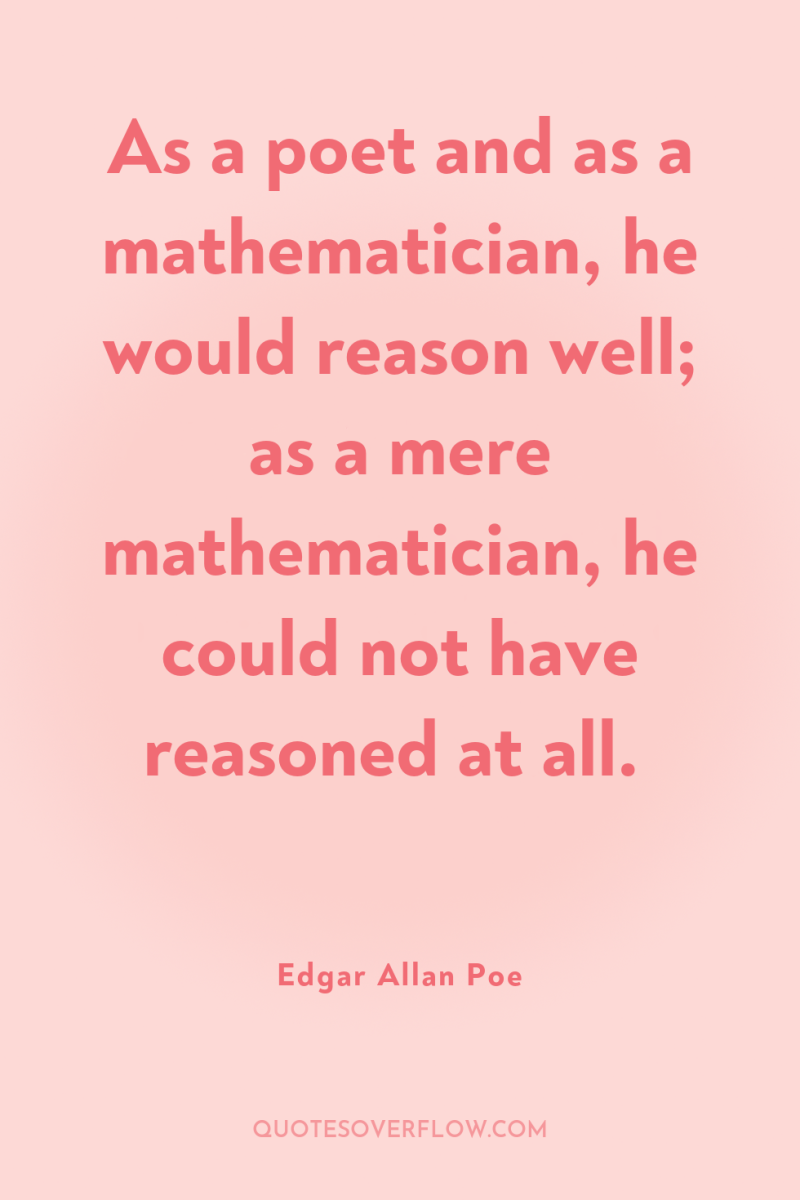
47
As a poet and as a mathematician, he would reason well; as a mere mathematician, he could not have reasoned at all.Edgar Allan Poe
48
A skillful literary artist has constructed a tale. If wise, he has not fashioned his thoughts to accommodate his incidents; but having conceived, with deliberate care, a certain unique or single effect to be wrought out, he then invents as may best aid him in establishing this preconceived effect. If his very initial sentence tend not to the outbringing of this effect, then he has failed in his first step. In the whole composition there should be no words written, of which the tendency, direct or indirect, is not to the one pre-established design. And by such means, with such care and skill, a picture is at length painted which leaves in the mind of him who contemplates it with a kindred art, a sense of the fullest satisfaction. The idea of the tale has been presented unblemished because undisturbed: and this is an end unattainable by the novel. Undue brevity is just as exceptionable here as in the poem; but undue length is yet more to be avoided. .Edgar Allan Poe
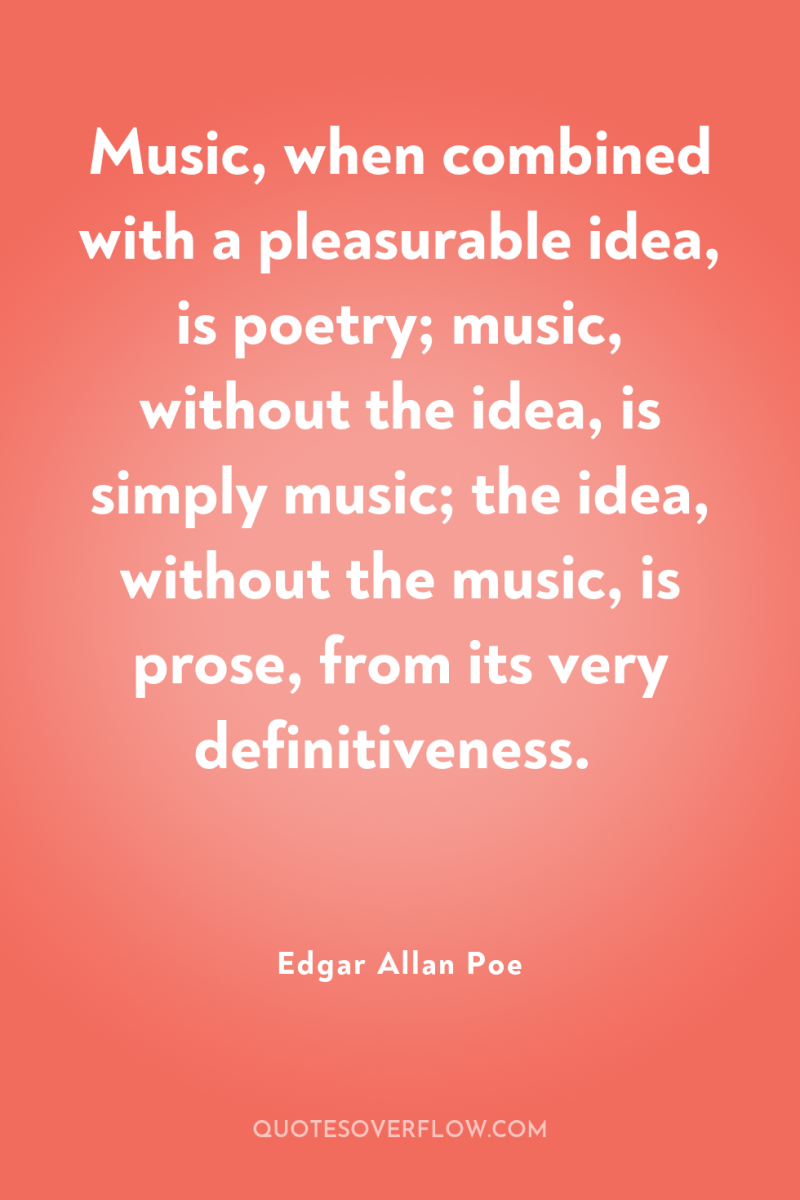
49
Music, when combined with a pleasurable idea, is poetry; music, without the idea, is simply music; the idea, without the music, is prose, from its very definitiveness.Edgar Allan Poe
50
Ah, distinctly I remember it was in the bleak December And each separate dying ember wrought its ghost upon the floor. Eagerly I wished the morrow; – vainly I had sought to borrow From my books surcease of sorrow – sorrow for the lost Lenore.Edgar Allan Poe
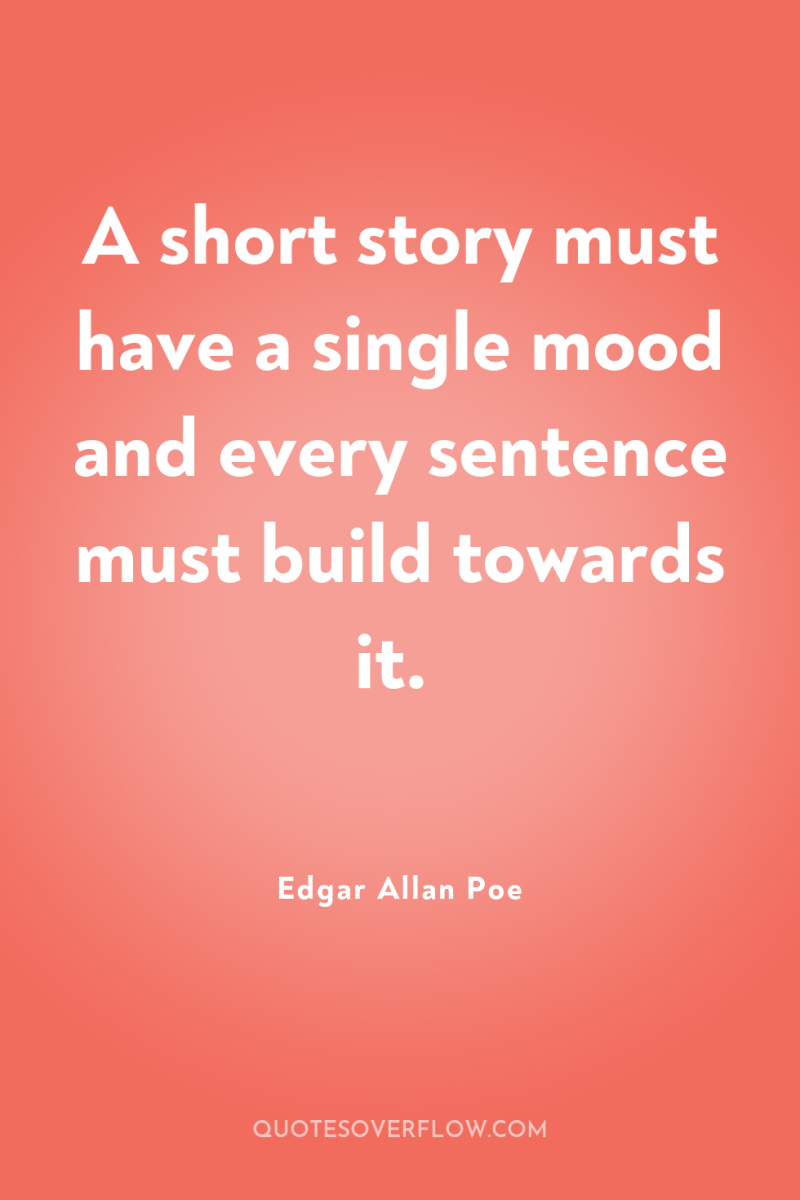
51
A short story must have a single mood and every sentence must build towards it.Edgar Allan Poe
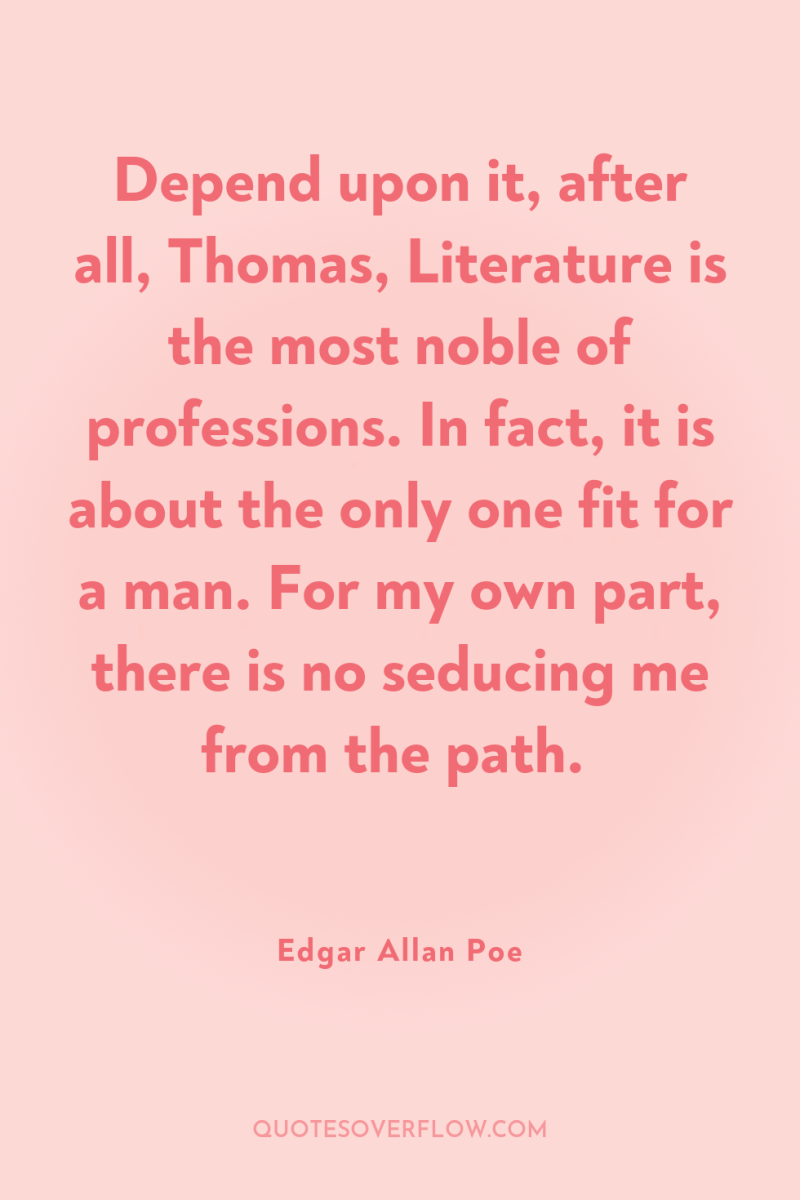
52
Depend upon it, after all, Thomas, Literature is the most noble of professions. In fact, it is about the only one fit for a man. For my own part, there is no seducing me from the path.Edgar Allan Poe
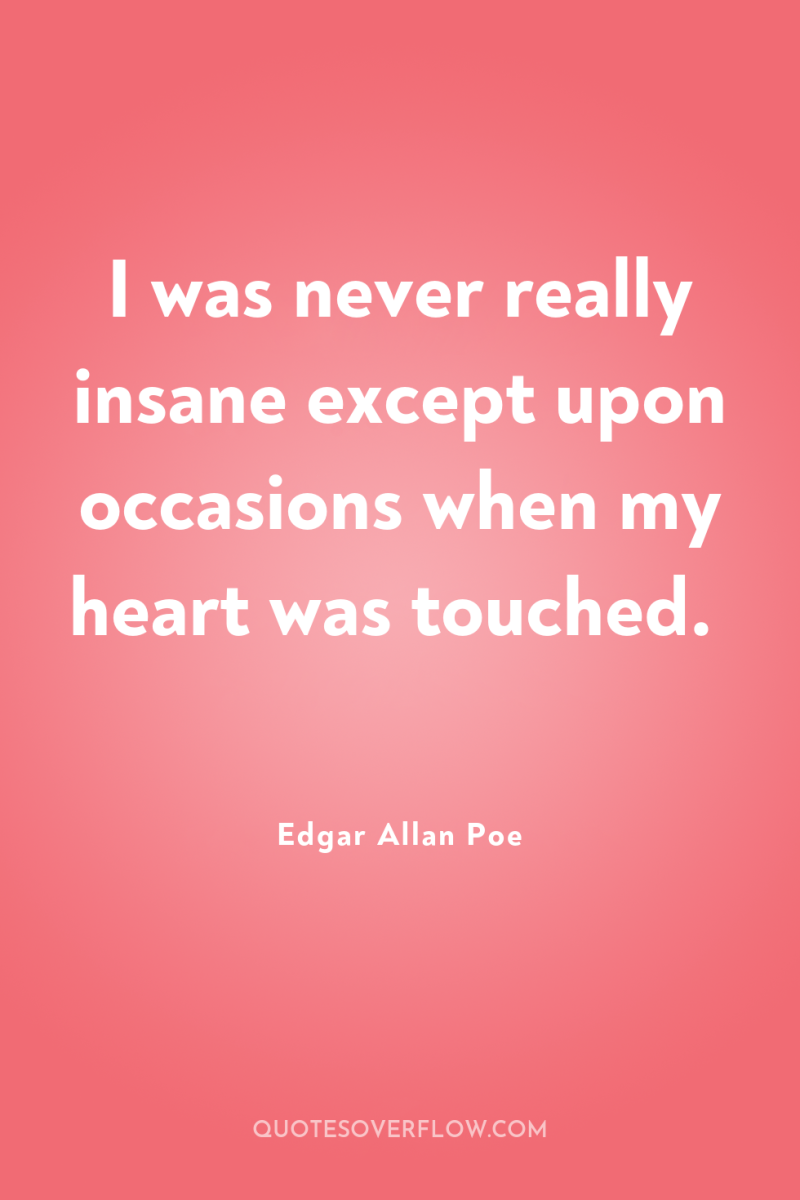
53
I was never really insane except upon occasions when my heart was touched.Edgar Allan Poe
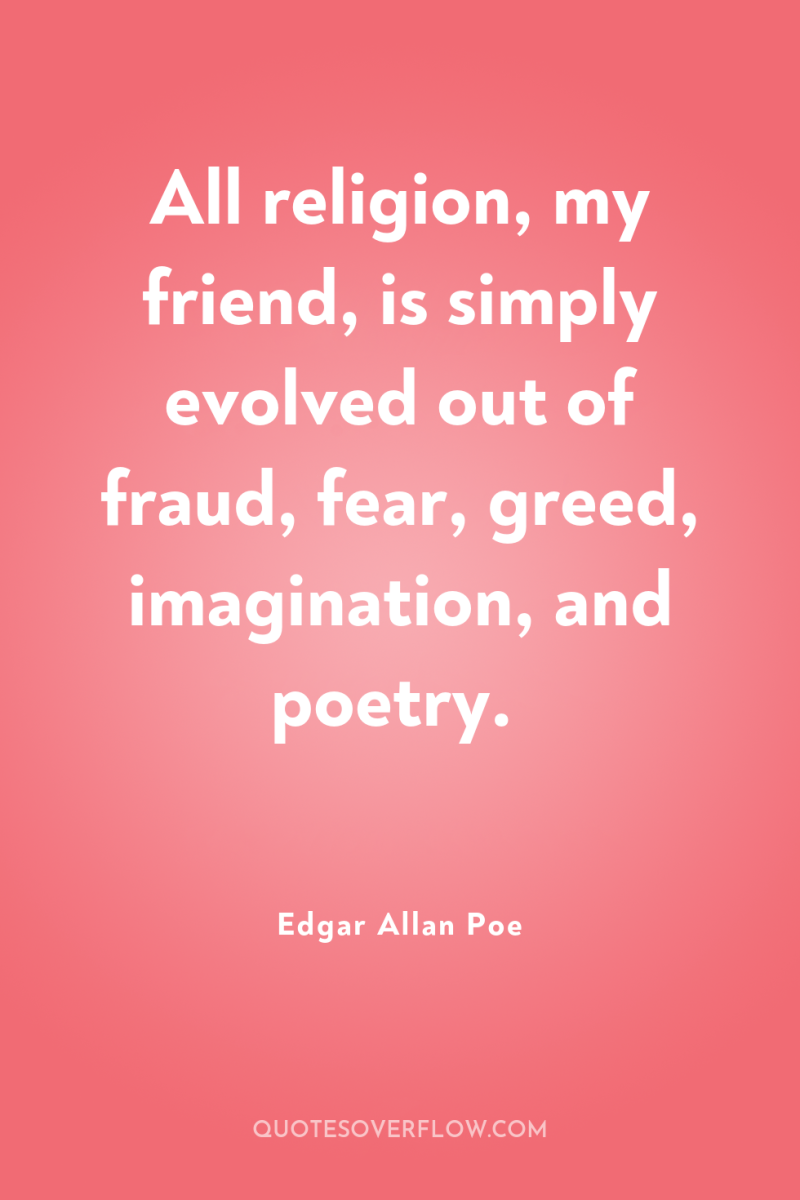
54
All religion, my friend, is simply evolved out of fraud, fear, greed, imagination, and poetry.Edgar Allan Poe
55
If Pierre Bon-Bon had his failings--and what great man has not a thousand?--if Pierre Bon-Bon, I say, had his failings, they were failings of very little importance--faults indeed which, in other tempers, have often been looked upon rather in the light of virtues.Edgar Allan Poe
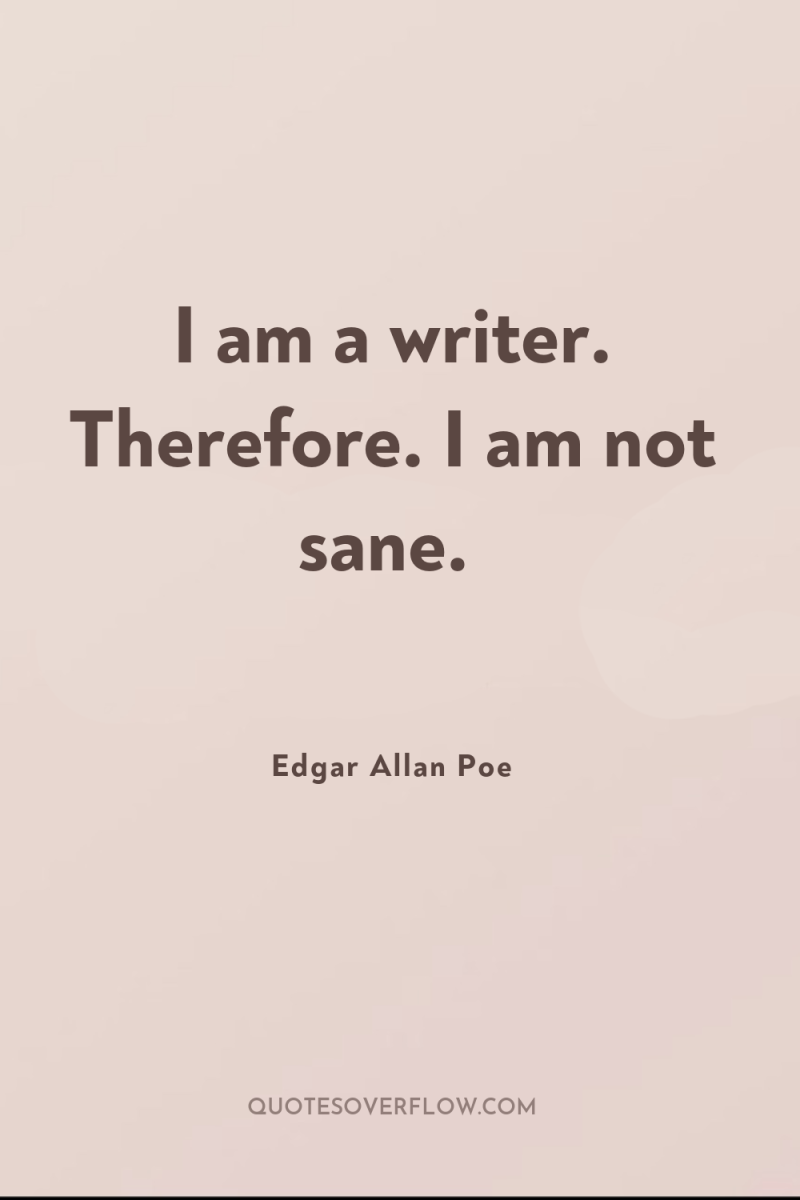
56
I am a writer. Therefore. I am not sane.Edgar Allan Poe
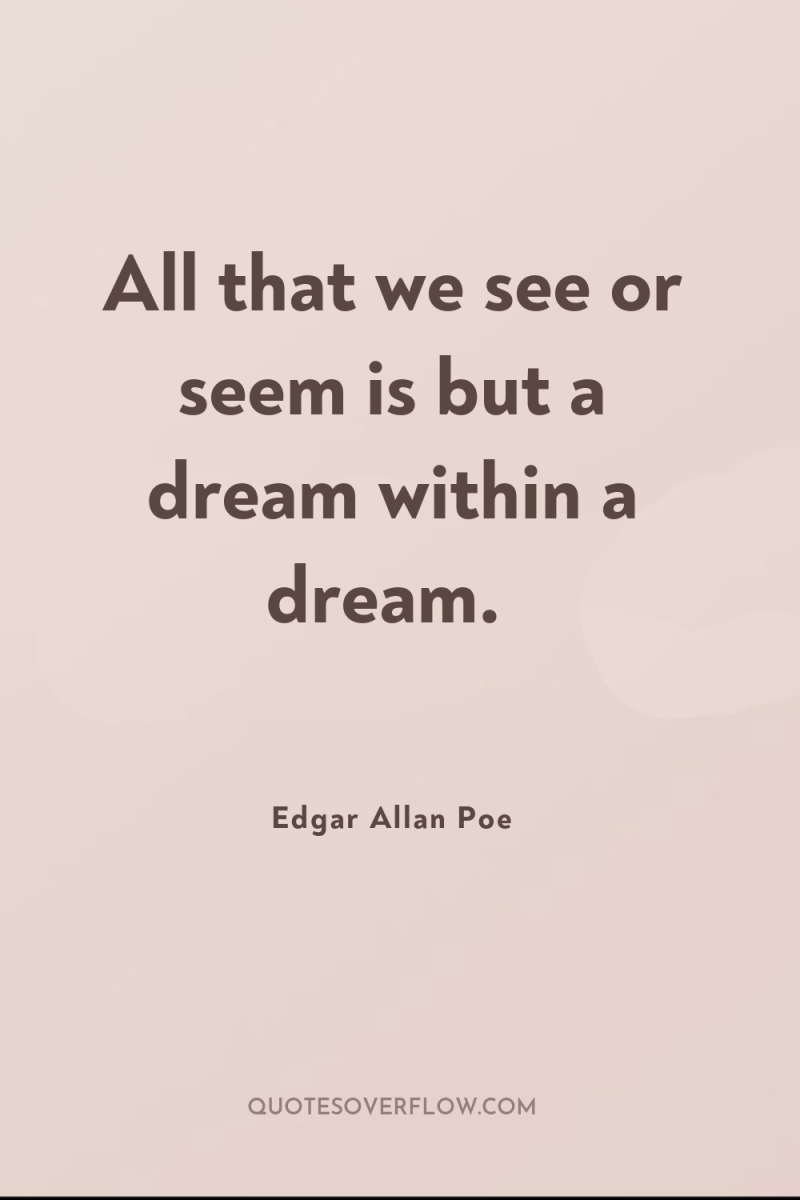
57
All that we see or seem is but a dream within a dream.Edgar Allan Poe
58
Those who dream by day are cognizant of many things which escape those who dream only by night.Edgar Allan Poe
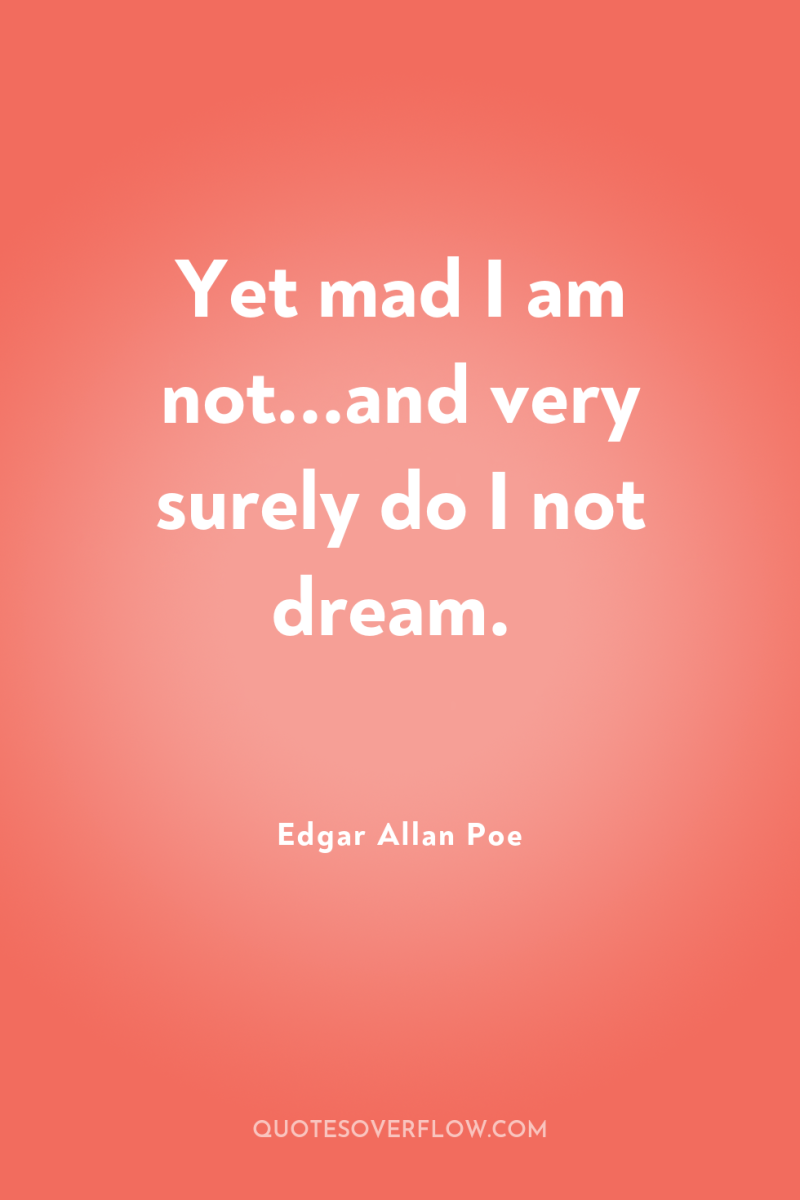
59
Yet mad I am not...and very surely do I not dream.Edgar Allan Poe
60
Take this kiss upon the brow! And, in parting from you now, Thus much let me avow- You are not wrong, who deem That my days have been a dream; Yet if hope has flown away In a night, or in a day, In a vision, or inEdgar Allan Poe
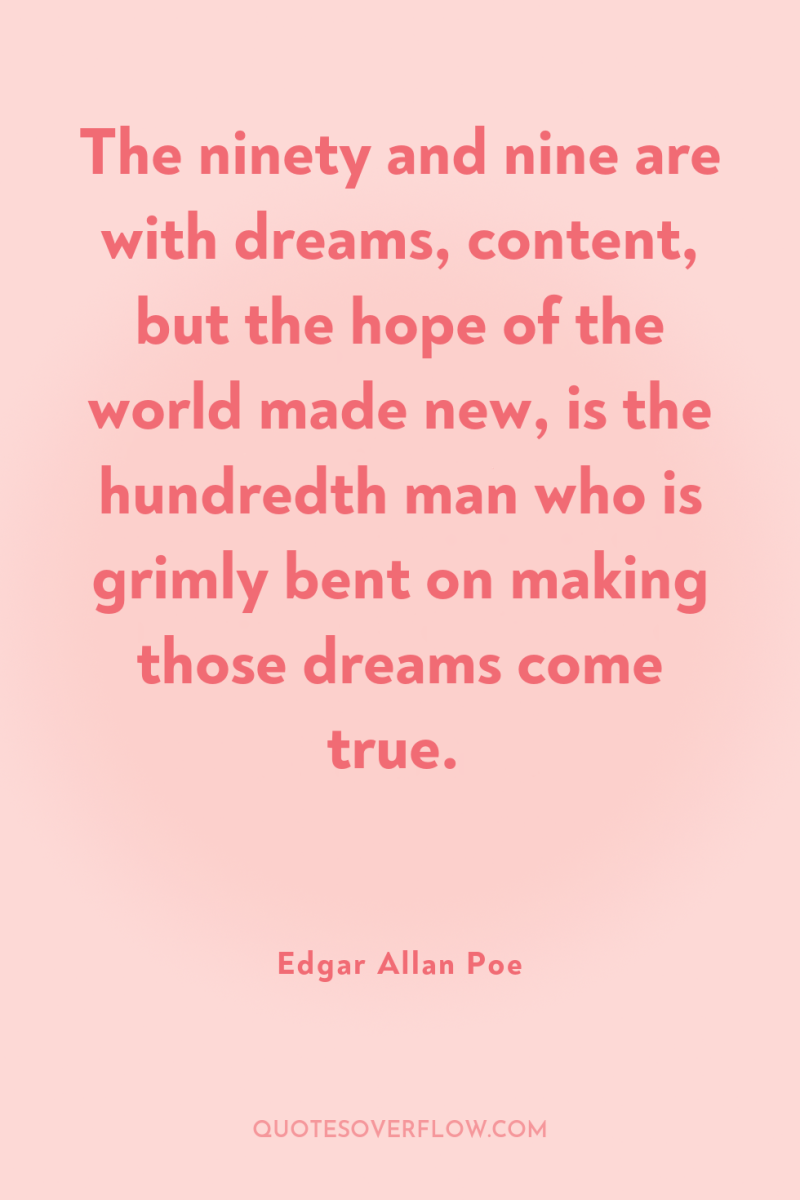
61
The ninety and nine are with dreams, content, but the hope of the world made new, is the hundredth man who is grimly bent on making those dreams come true.Edgar Allan Poe
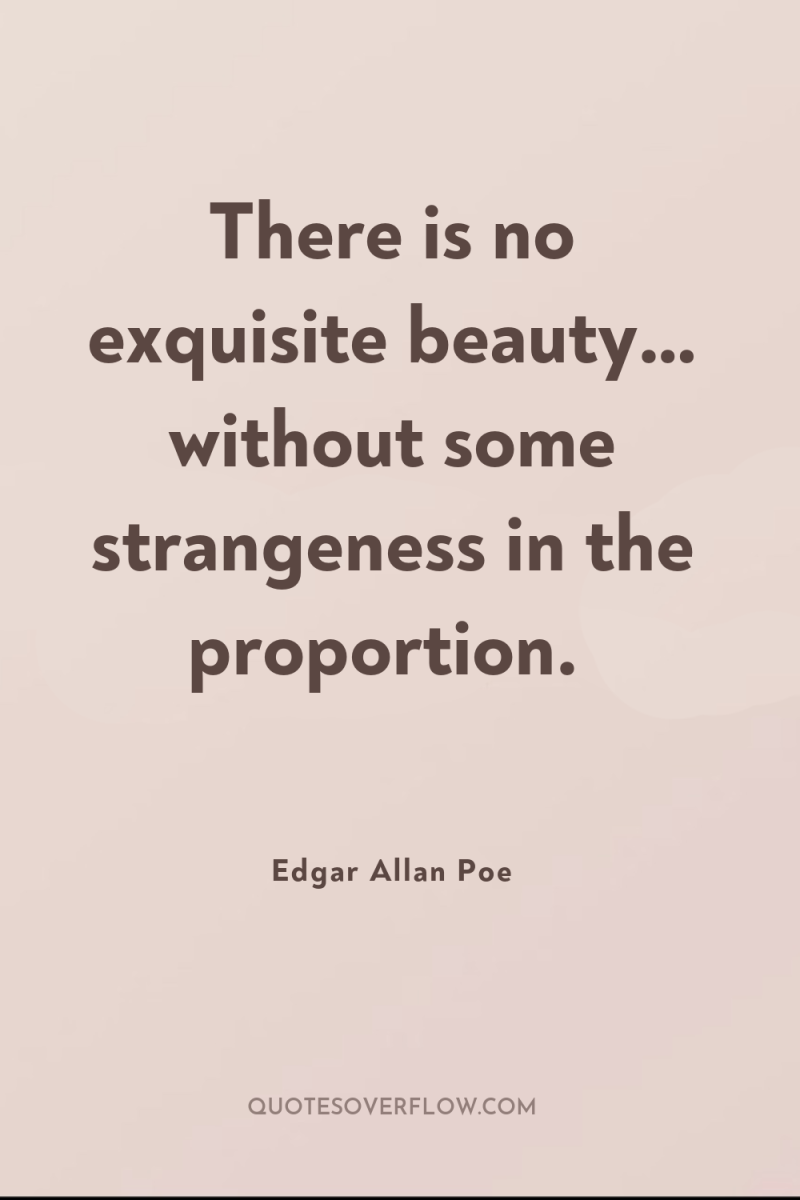
62
There is no exquisite beauty… without some strangeness in the proportion.Edgar Allan Poe
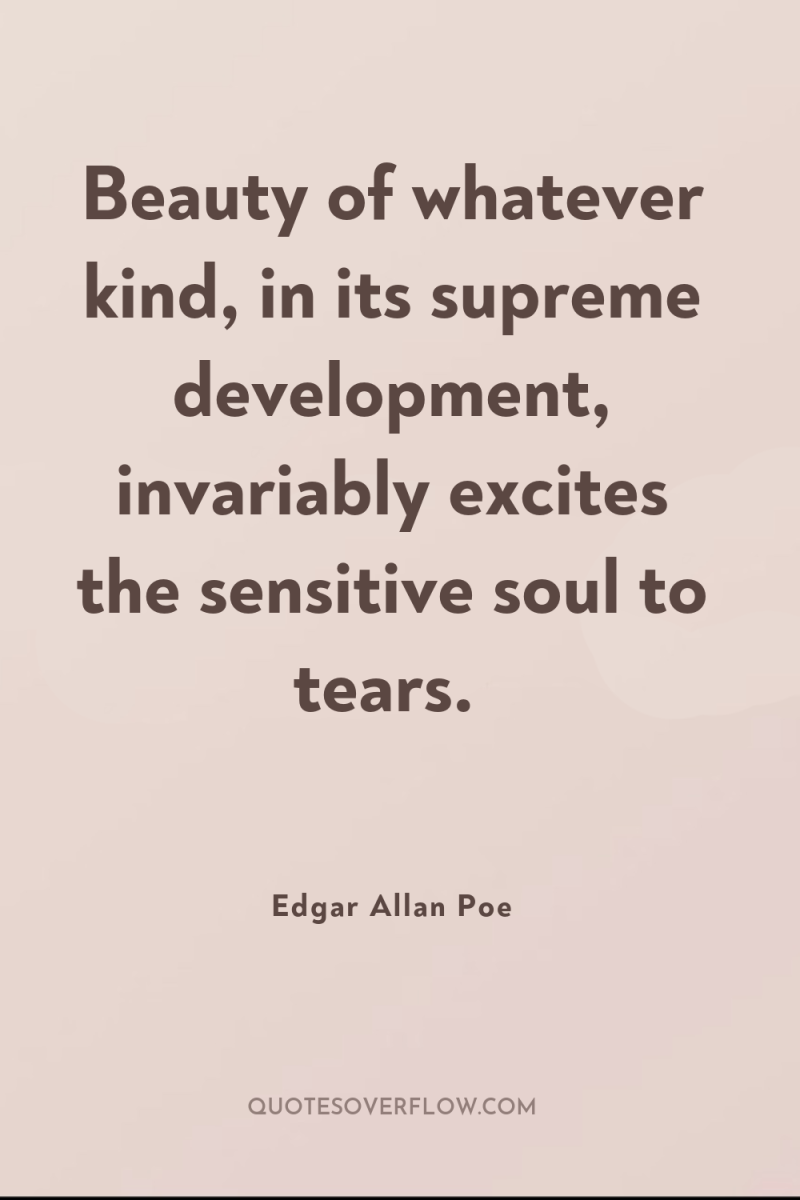
63
Beauty of whatever kind, in its supreme development, invariably excites the sensitive soul to tears.Edgar Allan Poe
64
In beauty of face no maiden ever equaled her. It was the radiance of an opium-dream - an airy and spirit-lifting vision more wildly divine than the fantasies which hovered about the slumbering souls of the daughters of Delos.Edgar Allan Poe
65
When, indeed, men speak of Beauty, they mean, precisely, not a quality, as is supposed, but an effect - they refer, in short, just to that intense and pure elevation of soul - not of intellect, or of heart.Edgar Allan Poe
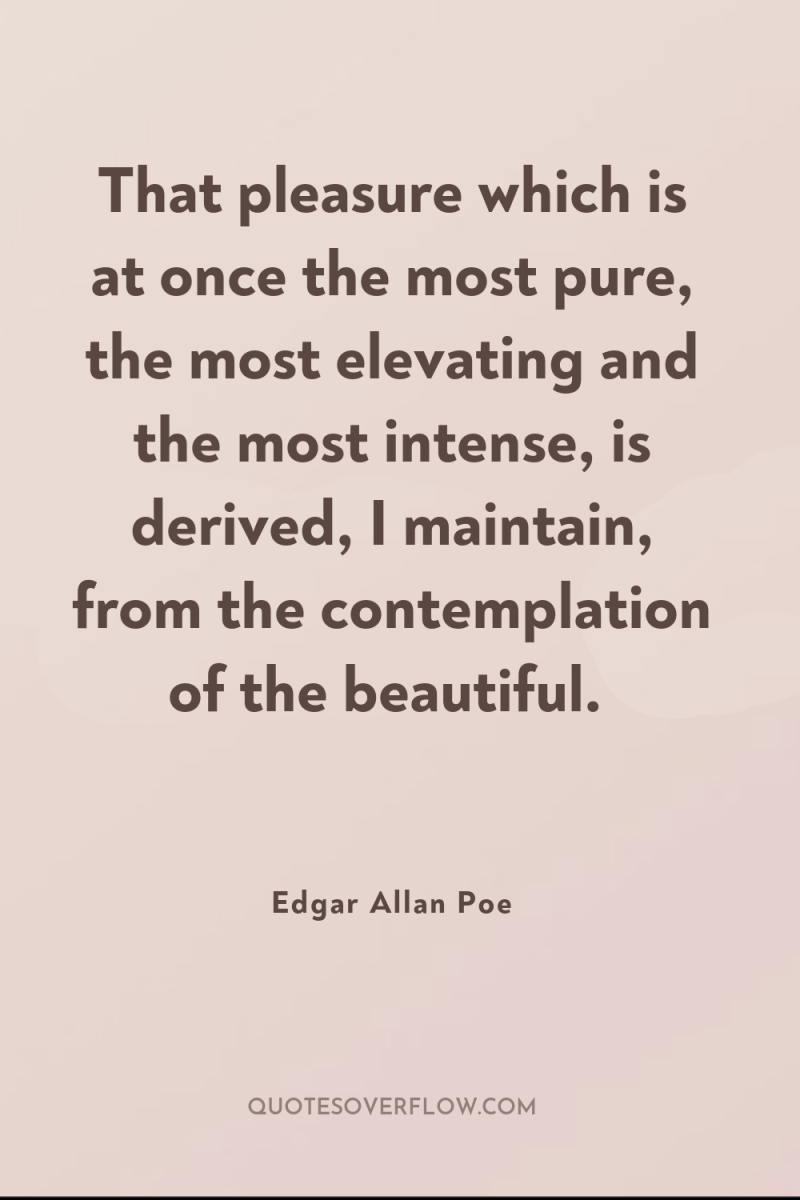
66
That pleasure which is at once the most pure, the most elevating and the most intense, is derived, I maintain, from the contemplation of the beautiful.Edgar Allan Poe
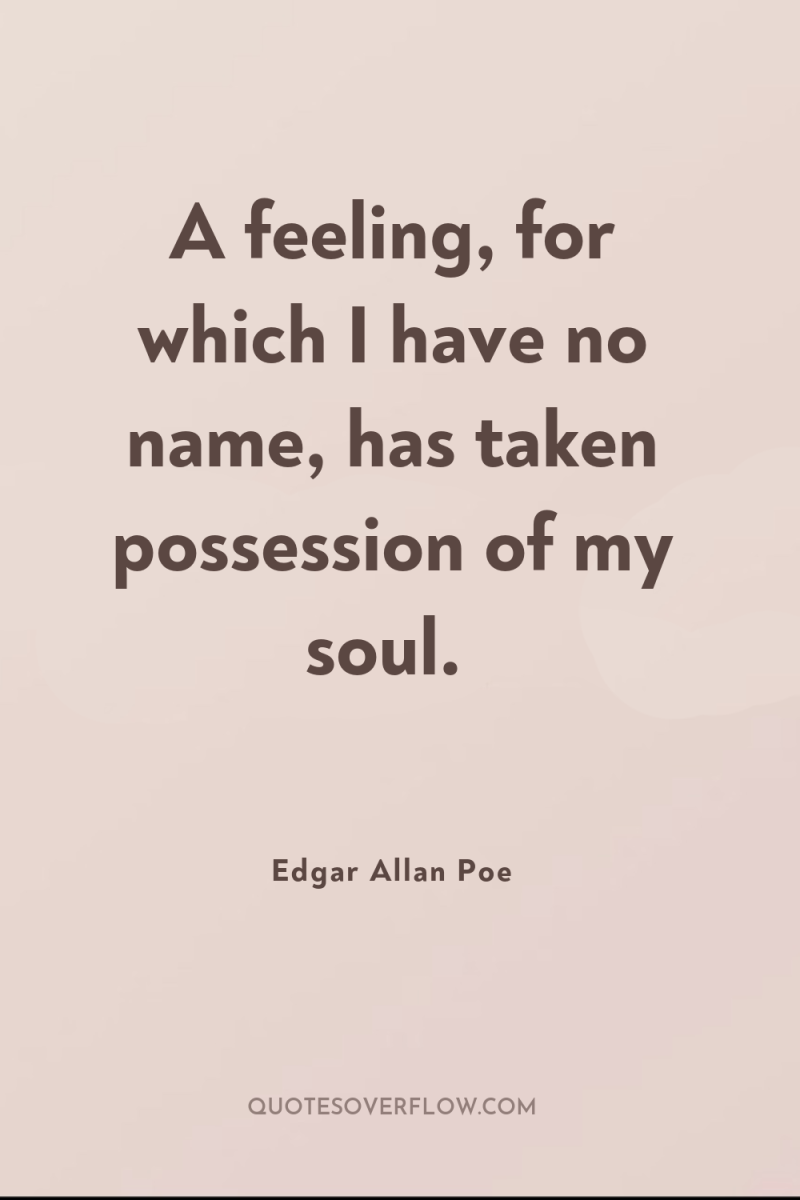
67
A feeling, for which I have no name, has taken possession of my soul.Edgar Allan Poe
68
And thus when by Poetry, or when by Music, the most entrancing of the poetic moods, we find ourselves melted into tears, we weep then, not.. through excess of pleasure, but through a certain petulant, impatient sorrow at our inability to grasp now, wholly, here on earth, at once and forever, those divine and raptorous joys of which through the poem, or through the music, we attain to but brief and indeterminate glimpses.Edgar Allan Poe
69
I intend to put up with nothing that I can putEdgar Allan Poe
70
Men have called me mad; but the question is not yet settled, whether madness is or is not the loftiest intelligence— whether much that is glorious— whether all that is profound— does not spring from disease of thought— from moods of mind exalted at the expense of the general intellect.Edgar Allan Poe
71
Men have called me mad; but the question is not settled whether madness is or is not the loftiest intelligence -- whether much that is glorious -- whether all that is profound -- does not spring from disease of thought -- from moods of mind exalted at the expense of the general intellect. They who dream by day are cognizant of many things which escape those who only dream by night. In their gray visions they obtain glimpses of eternity, and thrill, in waking, to find that they have been upon the verge of the great secret. In snatches, they learn something of the wisdom which is of good, and more of the mere knowledge which is of evil. They penetrate, however rudderless or compassless, into the vast ocean of the ‘light ineffable’.Edgar Allan Poe
72
Men have called me mad; but the question is not yet settled, whether madness is or is not the loftiest intelligence.Edgar Allan Poe
73
In the strange anomaly of my existence, feelings with me had never been of the heart, and my passions always were of the mind.Edgar Allan Poe
74
And have I not told you that what you mistake for madness is but over-acuteness of the sense?Edgar Allan Poe
75
I AM come of a race noted for vigor of fancy and ardor of passion. Men have called me mad; but the question is not yet settled, whether madness is or is not the loftiest intelligence--whether much that is glorious--whether all that is profound--does not spring from disease of thought--from moods of mind exalted at the expense of the general intellect. They who dream by day are cognizant of many things which escape those who dream only by night. In their gray visions they obtain glimpses of eternity, and thrill, in waking, to find that they have been upon the verge of the great secret. In snatches, they learn something of the wisdom which is of good, and more of the mere knowledge which is of evil. They penetrate, however, rudderless or compassless into the vast ocean of the "light ineffable", and again, like the adventures of the Nubian geographer, "agressi sunt mare tenebrarum, quid in eo esset exploraturi". We will say then, that I am mad. .Edgar Allan Poe
76
I have absolutely no pleasure in the stimulants in which I sometimes so madly indulge. It has not been in the pursuit of pleasure that I have periled life and reputation and reason. It has been the desperate attempt to escape from torturing memories, from a sense of insupportable loneliness and a dread of some strange impending doom.Edgar Allan Poe
77
Once upon a midnight dreary, while I pondered, weak and weary, Over many a quaint and curious volume of forgotten lore, While I nodded, nearly napping, suddenly there came a tapping, As of some one gently rapping, rapping at my chamber door. Tis some visitor, " I muttered, "tapping at my chamber door – Only this, and nothing more." Ah, distinctly I remember it was in the bleak December, And each separate dying ember wrought its ghost upon the floor. Eagerly I wished the morrow; – vainly I had sought to borrow From my books surcease of sorrow – sorrow for the lost Lenore –For the rare and radiant maiden whom the angels name Lenore – Nameless here for evermore. And the silken sad uncertain rustling of each purple curtain Thrilled me – filled me with fantastic terrors never felt before; So that now, to still the beating of my heart, I stood repeating, Tis some visitor entreating entrance at my chamber door –Some late visitor entreating entrance at my chamber door; – This it is, and nothing more." Presently my soul grew stronger; hesitating then no longer, Sir, " said I, "or Madam, truly your forgiveness I implore; But the fact is I was napping, and so gently you came rapping, And so faintly you came tapping, tapping at my chamber door, That I scarce was sure I heard you"– here I opened wide the door; – Darkness there, and nothing more. Deep into that darkness peering, long I stood there wondering, fearing, Doubting, dreaming dreams no mortals ever dared to dream before; But the silence was unbroken, and the stillness gave no token, And the only word there spoken was the whispered word, "Lenore?"This I whispered, and an echo murmured back the word, "Lenore! " – Merely this, and nothing more. Back into the chamber turning, all my soul within me burning, Soon again I heard a tapping somewhat louder than before. Surely, " said I, "surely that is something at my window lattice: Let me see, then, what thereat is, and this mystery explore –Let my heart be still a moment and this mystery explore; – 'Tis the wind and nothing more." Open here I flung the shutter, when, with many a flirt and flutter, In there stepped a stately raven of the saintly days of yore; Not the least obeisance made he; not a minute stopped or stayed he; But, with mien of lord or lady, perched above my chamber door –Perched upon a bust of Pallas just above my chamber door – Perched, and sat, and nothing more. Then this ebony bird beguiling my sad fancy into smiling, By the grave and stern decorum of the countenance it wore. Though thy crest be shorn and shaven, thou, " I said, "art sure no craven, Ghastly grim and ancient raven wandering from the Nightly shore –Tell me what thy lordly name is on the Night's Plutonian shore! " Quoth the Raven, "Nevermore."Much I marveled this ungainly fowl to hear discourse so plainly, Though its answer little meaning– little relevancy bore; For we cannot help agreeing that no living human being Ever yet was blest with seeing bird above his chamber door –Bird or beast upon the sculptured bust above his chamber door, With such name as "Nevermore.Edgar Allan Poe
78
I do believe God gave me a spark of genius, but he quenched it in misery.Edgar Allan Poe
79
You will observe that the stories told are all about money-seekers, not about money-finders.Edgar Allan Poe
80
Yet I am not more sure that my soul lives, than I am that perverseness is one of the primitive impulses of the human heart - one of the indivisible primary faculties, or sentiments, which give direction to the character of Man. Who has not, a hundred times, found himself committing a vile or a silly action, for no other reason than because he knows he should not? Have we not a perpetual inclination, in the teeth of our best judgment, to violate that which is Law, merely because we understand it to be such? .Edgar Allan Poe
81
It is more than probable that I am not understood; but I fear, indeed, that it is in no manner possible to convey to the mind of the merely general reader, an adequate idea of that nervous intensity of interest with which, in my case, the powers of meditation (not to speak technically) busied and buried themselves, in the contemplation of even the most ordinary objects of the universe.Edgar Allan Poe
82
So resolute is the world to despise anything which carries with it an air of simplicity.Edgar Allan Poe
83
Ah, dream too bright to last! Ah, starry Hope! that didst arise But to be overcast! A voice from out the Future cries, "On! on! " – but o'er the Past (Dim gulf! ) my spirit hovering lies Mute, motionless, aghast.Edgar Allan Poe
84
Ah, not in knowledge is happiness, but in the acquisition of knowledge! In forever knowing, we are forever blessed; but to know all, were the curse of a fiend.Edgar Allan Poe
85
Then, methought, the air grew denser, perfumed from an unseen censer Swung by Seraphim whose footfalls tinkled on the tufted floor." Wretch, " I cried, "thy God hath lent thee--by these angels he hath sent thee-- Respite--respite and nepenthe from thy memories of Lenore! Quaff, oh quaff this kind nepenthe, and forget this lost Lenore! "Quothe the Raven, "Nevermore.Edgar Allan Poe
86
How had I deserved to be so blessed by such confessions? –how had I deserved to be so cursed with the removal of my beloved in the hour of her making them, But upon this subject I cannot bear to dilate.Edgar Allan Poe
87
The eye, like a shattered mirror, multiplies the images of sorrow.Edgar Allan Poe
88
Misery is manifold. The wretchedness of earth is multiform. Overreaching the wide horizon as the rainbow, its hues are as various as the hues of that arch, --as distinct too, yet as intimately blended. Overreaching the wide horizon as the rainbow! How is it that from beauty I have derived a type of unloveliness? --from the covenant of peace a simile of sorrow? But as, in ethics, evil is a consequence of good, so, in fact, out of joy is sorrow born. Either the memory of past bliss is the anguish of to-day, or the agonies which are have their origin in the ecstasies which might have been.Edgar Allan Poe
89
In death - no! even in the grave all is not lost. Else there is no immortality for man. Arousing from the most profound slumbers, we break the gossamer web of some dream. Yet in a second afterward, (so frail may that web have been) we remember not that we have dreamed.Edgar Allan Poe
90
If you wish to forget anything on the spot, make a note that this thing is to be remembered.Edgar Allan Poe
91
In our endeavors to recall to memory something long forgotten, we often find ourselves upon the very verge of remembrance, without being able, in the end, to remember.Edgar Allan Poe
92
Horrors of a nature most stern and most appalling would too frequently obtrude themselves upon my mind, and shake the innermost depths of my soul with the bare supposition of their possibility.Edgar Allan Poe
93
From childhood's hour I have not been As others were - I have not seen As others saw - I could not bring My passions from a common spring -Edgar Allan Poe
94
That single thought is enough. The impulse increases to a wish, the wish to a desire, the desire to an uncontrollable longing, and the longing (to the deep regret and mortification of the speaker, and in defiance of all consequences, ) is indulged.Edgar Allan Poe
95
It all depends on the robber's knowledge of the loser's knowledge of the robber. - DaupinEdgar Allan Poe
96
There are some secrets which do not permit themselves to be told. Men die nightly in their beds, wringing the hands of ghostly confessors, and looking them piteously in the eyes – die with despair of heart and convulsion of throat, on account of the hideousness of mysteries which will not suffer themselves to be revealed.Edgar Allan Poe
97
I have before suggested that a genuine blackguard is never without a pocket-handkerchief.Edgar Allan Poe
98
The scariest monsters are the ones that lurk within our souls...Edgar Allan Poe
99
And thus, as a closer and still closer intimacy admitted me more unreservedly into recesses if his spirit, the more bitterly did I perceive the futility of all attempt at cheering a mind from which darkness, as if an inherent positive quality, poured forth upon all objects of the moral and physical universe in one unceasing radiation of gloom.Edgar Allan Poe
100
Believe nothing you hear, and only one half that you see.Edgar Allan Poe